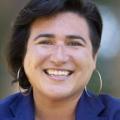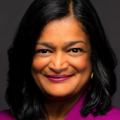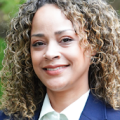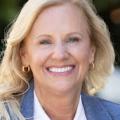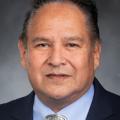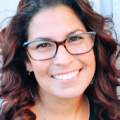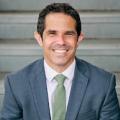Washington Bikes endorses electoral candidates at all levels of government. Endorsement and support are given to candidates who commit to or have a record of making communities better for people on bikes — through growing local economies, improving health outcomes, or creating safer streets and roadways. Additionally, Washington Bikes makes endorsements of ballot measures which will benefit Washington communities through bolstering transportation choices, supporting outdoor recreation, and working to safely connect neighborhoods and cities.
Statewide Ballot Measures
The Climate Commitment Act (CCA) makes big polluters pay for the harm they cause to our air, water, and communities and creates a roadmap for reducing emissions over time. I-2117 is a multi-millionaire-funded initiative that would eliminate the CCA and ban Washington from ever creating something similar.
Voting no on I-2117 is critical for our environment and communities. Without the funds raised by the CCA, many popular programs would be terminated, threatened, or reduced — including wildfire resilience, school-based bike programs, free bus fare for students, updating our ferry system, restoring fish habitats, and increasing the sustainable supply of water. The revenue from the Climate Commitment Act also creates good-paying, local job opportunities such as making homes more energy-efficient and installing heat pumps and solar panels. Ending the CCA would shift the burden of paying for the impacts of pollution away from polluters and onto our families and communities.
Behind this initiative is Republican mega-donor and hedge fund manager Brian Heywood, who has personally spent more than $6 million to put this measure on the ballot. He’s partnered with MAGA Republican Party Chair Jim Walsh to roll back the ways our elected leaders have made life better in Washington in recent years with no care about the damage to our communities he leaves in his wake.
I-2117 would mean more toxic air pollution and wildfires, causing more kids and seniors to suffer from asthma and heart conditions. The Climate Commitment Act is our state's best shot at creating a healthy future for all of us in Washington. Vote no on I-2117 to keep the CCA in place.
The Climate Commitment Act (CCA) makes big polluters pay for the harm they cause to our air, water, and communities and creates a roadmap for reducing emissions over time. I-2117 is a multi-millionaire-funded initiative that would eliminate the CCA and ban Washington from ever creating something similar.
Voting no on I-2117 is critical for our environment and communities. Without the funds raised by the CCA, many popular programs would be terminated, threatened, or reduced — including wildfire resilience, school-based bike programs, free bus fare for students, updating our ferry system, restoring fish habitats, and increasing the sustainable supply of water. The revenue from the Climate Commitment Act also creates good-paying, local job opportunities such as making homes more energy-efficient and installing heat pumps and solar panels. Ending the CCA would shift the burden of paying for the impacts of pollution away from polluters and onto our families and communities.
Behind this initiative is Republican mega-donor and hedge fund manager Brian Heywood, who has personally spent more than $6 million to put this measure on the ballot. He’s partnered with MAGA Republican Party Chair Jim Walsh to roll back the ways our elected leaders have made life better in Washington in recent years with no care about the damage to our communities he leaves in his wake.
I-2117 would mean more toxic air pollution and wildfires, causing more kids and seniors to suffer from asthma and heart conditions. The Climate Commitment Act is our state's best shot at creating a healthy future for all of us in Washington. Vote no on I-2117 to keep the CCA in place.
Federal
Democrat Maria Cantwell is running for another term in the U.S. Senate, where she has served the state of Washington since 2001. Before that, she served in the state Legislature and had a successful career in the private sector, leading marketing efforts for a large tech company.
In Congress, Cantwell has been a strong advocate for environmental protections and clean energy. She recently sponsored bills to protect waterways while promoting clean energy and strengthening tribal involvement in matters relating to conservation and land management. This spring, Cantwell partnered with Sen. Patty Murray to secure $28 million in funding to replace lead pipes in Washington and ensure safe drinking water across the state. In this race, she is running on a broad and detailed platform to address Washington’s most pressing issues, including protecting and restoring reproductive health access, increasing funding for K-12 and student loans, and expanding the affordable housing tax credit and other housing solutions.
Dr. Raul Garcia is the Republican challenger for the U.S. Senate seat. After initially announcing a campaign for governor, he is now running to install conservative leadership in one of Washington’s senate seats. Dr. Garcia is a Yakima-based doctor and hospital medical director who previously ran for governor in 2020. He has served in leadership positions across medical institutions, nonprofits, and small businesses. Garcia has received support from some of Washington’s most prominent conservatives.
Cantwell has been a thoughtful and hard-working advocate for the people of Washington. She has earned your vote for another term in the U.S. Senate.
Democrat Maria Cantwell is running for another term in the U.S. Senate, where she has served the state of Washington since 2001. Before that, she served in the state Legislature and had a successful career in the private sector, leading marketing efforts for a large tech company.
In Congress, Cantwell has been a strong advocate for environmental protections and clean energy. She recently sponsored bills to protect waterways while promoting clean energy and strengthening tribal involvement in matters relating to conservation and land management. This spring, Cantwell partnered with Sen. Patty Murray to secure $28 million in funding to replace lead pipes in Washington and ensure safe drinking water across the state. In this race, she is running on a broad and detailed platform to address Washington’s most pressing issues, including protecting and restoring reproductive health access, increasing funding for K-12 and student loans, and expanding the affordable housing tax credit and other housing solutions.
Dr. Raul Garcia is the Republican challenger for the U.S. Senate seat. After initially announcing a campaign for governor, he is now running to install conservative leadership in one of Washington’s senate seats. Dr. Garcia is a Yakima-based doctor and hospital medical director who previously ran for governor in 2020. He has served in leadership positions across medical institutions, nonprofits, and small businesses. Garcia has received support from some of Washington’s most prominent conservatives.
Cantwell has been a thoughtful and hard-working advocate for the people of Washington. She has earned your vote for another term in the U.S. Senate.
Congress
1st Congressional District
Rep. Suzan DelBene is seeking another term representing Washington Congressional District 1 in the U.S. House. DelBene has been a staunch advocate for working families, consumer protections and data privacy, health care, technology, and small businesses since she was first elected to the position in 2012. She also serves on the Pro-Choice Caucus. Professionally, her background is in tech, including working at Microsoft and leading a handful of local startups. In addition, she worked as the director of the Washington State Department of Revenue before joining Congress.
Some of DelBene’s greatest accomplishments in office include expanding the low-income housing and child tax credits, increasing access to baby formula across the country, funding job-training opportunities (resulting in $22 million for Washington state alone), and securing programs to support Americans struggling with substance abuse issues. In this race, she boasts a detailed, thoughtful platform that includes priorities to defend reproductive freedom, reduce the cost of living for working families, increase access to affordable health care, safeguard our local ecosystems and natural resources, strengthen the Social Security program, support Washington farms and food security, and more.
Her opponent Jeb Brewer works in program management and construction services. In 2022, Brewer challenged progressive Sen. John Lovick in Washington’s 44th Legislative District. Now, in his bid for Congress, Brewer is running on a moderately conservative platform. He says he wants to streamline the tax payment system but offers no ideas about how to balance our tax code so that corporations and the wealthy pay what they owe. Brewer shares support for health care affordability and environmental protections but criticizes the type of bold actions that can actually create progress on these issues.
DelBene is a strong Democratic voice in Congress who deserves your vote to continue advocating for Washington’s 1st Congressional District.
Rep. Suzan DelBene is seeking another term representing Washington Congressional District 1 in the U.S. House. DelBene has been a staunch advocate for working families, consumer protections and data privacy, health care, technology, and small businesses since she was first elected to the position in 2012. She also serves on the Pro-Choice Caucus. Professionally, her background is in tech, including working at Microsoft and leading a handful of local startups. In addition, she worked as the director of the Washington State Department of Revenue before joining Congress.
Some of DelBene’s greatest accomplishments in office include expanding the low-income housing and child tax credits, increasing access to baby formula across the country, funding job-training opportunities (resulting in $22 million for Washington state alone), and securing programs to support Americans struggling with substance abuse issues. In this race, she boasts a detailed, thoughtful platform that includes priorities to defend reproductive freedom, reduce the cost of living for working families, increase access to affordable health care, safeguard our local ecosystems and natural resources, strengthen the Social Security program, support Washington farms and food security, and more.
Her opponent Jeb Brewer works in program management and construction services. In 2022, Brewer challenged progressive Sen. John Lovick in Washington’s 44th Legislative District. Now, in his bid for Congress, Brewer is running on a moderately conservative platform. He says he wants to streamline the tax payment system but offers no ideas about how to balance our tax code so that corporations and the wealthy pay what they owe. Brewer shares support for health care affordability and environmental protections but criticizes the type of bold actions that can actually create progress on these issues.
DelBene is a strong Democratic voice in Congress who deserves your vote to continue advocating for Washington’s 1st Congressional District.
2nd Congressional District
Congressman Rick Larsen is running for re-election to the U.S. House in Washington's 2nd Congressional District. Larsen is a moderate Democrat who is serving his twelfth term in Congress and previously worked as a Snohomish County Council member. In office, he has specialized in areas of global trade, environmental conservation, and transportation and infrastructure, a committee on which he is the lead Democrat.
In office, Larsen has helped to make historic investments to address climate change, modernize infrastructure, and combat the opioid epidemic by giving Americans struggling with substance abuse the support they need. He is a reliable vote with the Biden administration’s priorities such as child tax credits, lowering prescription medication costs, voting rights, student loan reduction, and clean energy. He continues to be a more moderate voice in this race, rather than a leader for bold progress. If re-elected, Larsen wants to support working families and small businesses, address climate change, support reproductive freedom, prevent gun violence, and expand affordable health care so that everyone, regardless of income, can access the care and medication they need.
Conservative Cody Hart is also in this race with the familiar tagline to “Make America Great Again.” Hart is a civil engineer and Navy veteran who is using this campaign to espouse far-right ideas and conspiracy theories that only serve to distract from the issues facing the district. If elected, he wants to enact extremely restrictive laws on reproductive health care access, eliminate gun violence prevention policies, and prevent students from learning age-appropriate sexual health education.
We recommend Rick Larsen.
Congressman Rick Larsen is running for re-election to the U.S. House in Washington's 2nd Congressional District. Larsen is a moderate Democrat who is serving his twelfth term in Congress and previously worked as a Snohomish County Council member. In office, he has specialized in areas of global trade, environmental conservation, and transportation and infrastructure, a committee on which he is the lead Democrat.
In office, Larsen has helped to make historic investments to address climate change, modernize infrastructure, and combat the opioid epidemic by giving Americans struggling with substance abuse the support they need. He is a reliable vote with the Biden administration’s priorities such as child tax credits, lowering prescription medication costs, voting rights, student loan reduction, and clean energy. He continues to be a more moderate voice in this race, rather than a leader for bold progress. If re-elected, Larsen wants to support working families and small businesses, address climate change, support reproductive freedom, prevent gun violence, and expand affordable health care so that everyone, regardless of income, can access the care and medication they need.
Conservative Cody Hart is also in this race with the familiar tagline to “Make America Great Again.” Hart is a civil engineer and Navy veteran who is using this campaign to espouse far-right ideas and conspiracy theories that only serve to distract from the issues facing the district. If elected, he wants to enact extremely restrictive laws on reproductive health care access, eliminate gun violence prevention policies, and prevent students from learning age-appropriate sexual health education.
We recommend Rick Larsen.
6th Congressional District
State Sen. Emily Randall is running on a progressive and community-forward platform for retiring Rep. Derek Kilmer’s seat representing the 6th Congressional District in the U.S. House. Since joining the Legislature in 2019, Randall has been one of the most outspoken advocates of reproductive freedom and accessible health care for all. Before serving in elected office, she worked for a number of social justice-focused nonprofits, including Planned Parenthood.
In her first term in Olympia, Randall worked to expand health care access, reform the tax code, and raise the minimum wage for working people with disabilities. This term, she helped achieve major progressive victories through her leadership on bills to expand eligibility for financial aid programs, increase access to HIV treatment, and protect the privacy of patients receiving ultrasounds. Now, Randall is running to be a champion for accessible health care, working people, and a healthy environment. She wants to take measures to address climate change including investing in clean energy and green infrastructure. Randall wants to bring down the cost of American health care by expanding Medicaid, strengthening the Affordable Care Act, and making prescription drugs more affordable. She also has plans to strengthen our democracy, improve the quality of public education, and safeguard reproductive freedom.
Republican state Senator Drew MacEwen is also in this race. First elected to the state Legislature in 2012, MacEwen has been a staunch conservative voice in Olympia, including opposing clean energy initiatives, resources for Washington students, protections for local wildlife, and commonsense gun safety bills. In addition, MacEwen voted against an abortion shield law that protects Washington state health care workers when they provide abortion care to patients from Washington and from out of state. MacEwen's long voting record in Olympia makes it clear that he is far out of step with local voters.
We recommend Emily Randall due to her strong track record of community advocacy and broad support from progressive leaders across the district.
State Sen. Emily Randall is running on a progressive and community-forward platform for retiring Rep. Derek Kilmer’s seat representing the 6th Congressional District in the U.S. House. Since joining the Legislature in 2019, Randall has been one of the most outspoken advocates of reproductive freedom and accessible health care for all. Before serving in elected office, she worked for a number of social justice-focused nonprofits, including Planned Parenthood.
In her first term in Olympia, Randall worked to expand health care access, reform the tax code, and raise the minimum wage for working people with disabilities. This term, she helped achieve major progressive victories through her leadership on bills to expand eligibility for financial aid programs, increase access to HIV treatment, and protect the privacy of patients receiving ultrasounds. Now, Randall is running to be a champion for accessible health care, working people, and a healthy environment. She wants to take measures to address climate change including investing in clean energy and green infrastructure. Randall wants to bring down the cost of American health care by expanding Medicaid, strengthening the Affordable Care Act, and making prescription drugs more affordable. She also has plans to strengthen our democracy, improve the quality of public education, and safeguard reproductive freedom.
Republican state Senator Drew MacEwen is also in this race. First elected to the state Legislature in 2012, MacEwen has been a staunch conservative voice in Olympia, including opposing clean energy initiatives, resources for Washington students, protections for local wildlife, and commonsense gun safety bills. In addition, MacEwen voted against an abortion shield law that protects Washington state health care workers when they provide abortion care to patients from Washington and from out of state. MacEwen's long voting record in Olympia makes it clear that he is far out of step with local voters.
We recommend Emily Randall due to her strong track record of community advocacy and broad support from progressive leaders across the district.
7th Congressional District
Congresswoman Pramila Jayapal is running for another term in the U.S. House representing Washington’s 7th Congressional District. Jaypal was first elected to the position in 2016 and has since become one of the strongest progressive voices in Congress, advocating for immigration reform, civil liberties, and economic justice as the chair of the Progressive Caucus. In 2001, Jayapal founded the now largest immigrant rights organization in the state, OneAmerica. She has also been a leader on local issues, including championing Seattle’s $15 minimum wage effort on the Mayoral Advisory Committee.
In Congress, Jayapal has pioneered bold progress, including being a strong advocate for reproductive freedom and abortion access, supporting trans civil rights, and speaking out for immigrants. She has criticized President Biden’s harsher border policies and spoken in support of peace in the Middle East amidst the rising death toll in Gaza and growing concerns of a regional war. She recently announced the House Progressives' 2025 goals, which include raising wages, investing in our future with clean energy and K-12 education funding, eliminating the Senate filibuster, and increasing regulation and accountability for the nation’s largest companies.
Jayapal faces a challenge from Republican Dan Alexander, a manager at Boeing who works in defense. His website is unavailable as of mid-October, though he has shared a less progressive campaign vision in this race. Alexander offers vague support for a united and strong government, a reasonable cost of living, support for the arts, mitigation of pollution, and foreign policy that prioritizes peace. However, as a conservative without any policy proposals in this race, it is fair to assume Alexander wouldn't support progressive policy to uplift the entire community and achieve that vision.
Congresswoman Jayapal exemplifies what it means to bring progressive, community values to Congress. She is a key voice in the U.S. House working to uplift our nation’s most marginalized and she has earned your vote for another term representing Congressional District 7.
Congresswoman Pramila Jayapal is running for another term in the U.S. House representing Washington’s 7th Congressional District. Jaypal was first elected to the position in 2016 and has since become one of the strongest progressive voices in Congress, advocating for immigration reform, civil liberties, and economic justice as the chair of the Progressive Caucus. In 2001, Jayapal founded the now largest immigrant rights organization in the state, OneAmerica. She has also been a leader on local issues, including championing Seattle’s $15 minimum wage effort on the Mayoral Advisory Committee.
In Congress, Jayapal has pioneered bold progress, including being a strong advocate for reproductive freedom and abortion access, supporting trans civil rights, and speaking out for immigrants. She has criticized President Biden’s harsher border policies and spoken in support of peace in the Middle East amidst the rising death toll in Gaza and growing concerns of a regional war. She recently announced the House Progressives' 2025 goals, which include raising wages, investing in our future with clean energy and K-12 education funding, eliminating the Senate filibuster, and increasing regulation and accountability for the nation’s largest companies.
Jayapal faces a challenge from Republican Dan Alexander, a manager at Boeing who works in defense. His website is unavailable as of mid-October, though he has shared a less progressive campaign vision in this race. Alexander offers vague support for a united and strong government, a reasonable cost of living, support for the arts, mitigation of pollution, and foreign policy that prioritizes peace. However, as a conservative without any policy proposals in this race, it is fair to assume Alexander wouldn't support progressive policy to uplift the entire community and achieve that vision.
Congresswoman Jayapal exemplifies what it means to bring progressive, community values to Congress. She is a key voice in the U.S. House working to uplift our nation’s most marginalized and she has earned your vote for another term representing Congressional District 7.
8th Congressional District
Dr. Kim Schrier is running for a fourth term representing Congressional District 8 in the U.S. House. She was first elected in 2018 when she turned the seat blue for the first time in its history. Schrier is a former pediatrician who previously ran a local practice in Issaquah. In her past three terms in Congress, she has come to represent a pragmatic voice working across party lines to advocate for Washington’s working families and economic prosperity across our state.
In Congress, Rep. Schrier has leveraged her background in medicine as well as her strong community experience to advocate effectively for her constituents. This recent term, she sponsored a slate of health-related legislation, including bills to establish a state public option to make health care more affordable, to protect providers who work in reproductive health care, and to help kids access primary care. She was also a leader in bringing climate solutions to the agricultural industry, providing tax credits to working families, and addressing the baby formula shortage. Her past key votes have aligned with Biden’s more progressive bills including Build Back Better which would have made huge strides in addressing climate change, funding early childhood education, and extending the child tax credit. Schrier’s campaign platform in this race reflects her continued goals to build a healthy, prosperous future for all Washingtonians. Some of her progressive campaign priorities include women’s rights, gun violence prevention, corporate accountability, veteran support, child nutrition, environmental protections, and lowering the cost of living.
Carmen Goers is a Republican challenging Schrier in Washington’s 8th Congressional District. Goers is a veteran and a financial services professional of 25 years who has also served with the Kent Chamber of Commerce. In 2022, Goers ran for the state Legislature in the 47th Legislative District but lost to Chris Stearns. Now, she is running to bring conservative fiscal policy to Congress. This would mean bigger tax breaks for the wealthiest, prioritizing business profits above considerations like environmental sustainability or fair wages, and cutting public services that allow all Americans, regardless of background, to access the basics and build better futures. The people of the 8th CD deserve a representative who will place community needs first and make Washington a place where all residents have the opportunity to thrive. Goers is not that candidate.
Schrier has earned your vote for another term.
Dr. Kim Schrier is running for a fourth term representing Congressional District 8 in the U.S. House. She was first elected in 2018 when she turned the seat blue for the first time in its history. Schrier is a former pediatrician who previously ran a local practice in Issaquah. In her past three terms in Congress, she has come to represent a pragmatic voice working across party lines to advocate for Washington’s working families and economic prosperity across our state.
In Congress, Rep. Schrier has leveraged her background in medicine as well as her strong community experience to advocate effectively for her constituents. This recent term, she sponsored a slate of health-related legislation, including bills to establish a state public option to make health care more affordable, to protect providers who work in reproductive health care, and to help kids access primary care. She was also a leader in bringing climate solutions to the agricultural industry, providing tax credits to working families, and addressing the baby formula shortage. Her past key votes have aligned with Biden’s more progressive bills including Build Back Better which would have made huge strides in addressing climate change, funding early childhood education, and extending the child tax credit. Schrier’s campaign platform in this race reflects her continued goals to build a healthy, prosperous future for all Washingtonians. Some of her progressive campaign priorities include women’s rights, gun violence prevention, corporate accountability, veteran support, child nutrition, environmental protections, and lowering the cost of living.
Carmen Goers is a Republican challenging Schrier in Washington’s 8th Congressional District. Goers is a veteran and a financial services professional of 25 years who has also served with the Kent Chamber of Commerce. In 2022, Goers ran for the state Legislature in the 47th Legislative District but lost to Chris Stearns. Now, she is running to bring conservative fiscal policy to Congress. This would mean bigger tax breaks for the wealthiest, prioritizing business profits above considerations like environmental sustainability or fair wages, and cutting public services that allow all Americans, regardless of background, to access the basics and build better futures. The people of the 8th CD deserve a representative who will place community needs first and make Washington a place where all residents have the opportunity to thrive. Goers is not that candidate.
Schrier has earned your vote for another term.
9th Congressional District
Rep. Adam Smith is running for his 14th term in the U.S. House representing Congressional District 9. Smith has a long track record of advocacy and government work, including as a former lawyer, City of Seattle prosecutor, and Washington state senator. In Congress, Smith serves on the New Democrat Coalition and the Progressive Caucus. His district is the state’s most diverse – with a strong immigrant population and sizable Asian, Hispanic, and Black communities – and he has shown a demonstrated commitment to uplifting all residents in the district.
Smith is an influential voice in Congress and has previously supported some ambitious progressive bills such as the Green New Deal and the Medicare for All Act. This term, he sponsored bills to curtail hedge fund buy-ups of single-family homes, bring better job opportunities to foreign-trained, skilled medical professionals, and create more pathways to economic security for Americans without college degrees. Over the course of his tenure in Congress, Smith has been criticized for his more hawkish foreign policy stances – including supporting a larger U.S. role in the growing conflict in the Middle East. His top priorities in this race include, amongst others, reforming our criminal justice system, protecting LGBTQ+ civil rights, strengthening gun violence prevention, and pushing strong multi-industry approaches to addressing climate change.
We would like to see Smith continue to leverage his experience in office to pass bold, progressive policies in another term representing Congressional District 9, and we believe he is the best choice to do so.
Rep. Adam Smith is running for his 14th term in the U.S. House representing Congressional District 9. Smith has a long track record of advocacy and government work, including as a former lawyer, City of Seattle prosecutor, and Washington state senator. In Congress, Smith serves on the New Democrat Coalition and the Progressive Caucus. His district is the state’s most diverse – with a strong immigrant population and sizable Asian, Hispanic, and Black communities – and he has shown a demonstrated commitment to uplifting all residents in the district.
Smith is an influential voice in Congress and has previously supported some ambitious progressive bills such as the Green New Deal and the Medicare for All Act. This term, he sponsored bills to curtail hedge fund buy-ups of single-family homes, bring better job opportunities to foreign-trained, skilled medical professionals, and create more pathways to economic security for Americans without college degrees. Over the course of his tenure in Congress, Smith has been criticized for his more hawkish foreign policy stances – including supporting a larger U.S. role in the growing conflict in the Middle East. His top priorities in this race include, amongst others, reforming our criminal justice system, protecting LGBTQ+ civil rights, strengthening gun violence prevention, and pushing strong multi-industry approaches to addressing climate change.
We would like to see Smith continue to leverage his experience in office to pass bold, progressive policies in another term representing Congressional District 9, and we believe he is the best choice to do so.
10th Congressional District
Rep. Marilyn Strickland is running for a third term representing Washington’s Congressional District 10 in the U.S. House. Strickland has a long track record of public service as a mayor and city council member for Tacoma and as the former lead for both Pierce Transit and the Seattle Metropolitan Chamber of Commerce. When she was first elected to Congress in 2020, Strickland became the first African American and Korean American representative from Washington.
In office, Strickland has fought for a better quality of life for all Washingtonians. She boasts strong priorities and has fought for a community-focused agenda including holding corporations accountable, lowering the cost of prescription medicine, strengthening voting rights, and investing in infrastructure like broadband, roadways, and parks. In her most recent term, Strickland sponsored legislation to fund grants for women and underrepresented communities in STEM, to address the workforce shortage in senior services and childcare, and to support military firefighters who have been exposed to toxic chemicals in the line of duty. Strickland is also a staunch advocate of reproductive freedom for all, and this past March, she sponsored a bill to provide federal financial assistance for those traveling to access reproductive health care. In this race, she has a strong, detailed, progressive platform that addresses pressing issues in western Washington.
Engineer Don Hewett is the Republican challenging Strickland in this race. His platform is based on complaining about so-called establishment politics and yet, unfortunately, Hewett’s own priorities do not better represent the will of the people. If elected to Congress, he is running on a typically conservative platform that emphasizes cuts to social services. He is not a progressive choice for residents in the 10th Congressional District.
Strickland has earned your vote for another term representing the 10th Congressional District.
Rep. Marilyn Strickland is running for a third term representing Washington’s Congressional District 10 in the U.S. House. Strickland has a long track record of public service as a mayor and city council member for Tacoma and as the former lead for both Pierce Transit and the Seattle Metropolitan Chamber of Commerce. When she was first elected to Congress in 2020, Strickland became the first African American and Korean American representative from Washington.
In office, Strickland has fought for a better quality of life for all Washingtonians. She boasts strong priorities and has fought for a community-focused agenda including holding corporations accountable, lowering the cost of prescription medicine, strengthening voting rights, and investing in infrastructure like broadband, roadways, and parks. In her most recent term, Strickland sponsored legislation to fund grants for women and underrepresented communities in STEM, to address the workforce shortage in senior services and childcare, and to support military firefighters who have been exposed to toxic chemicals in the line of duty. Strickland is also a staunch advocate of reproductive freedom for all, and this past March, she sponsored a bill to provide federal financial assistance for those traveling to access reproductive health care. In this race, she has a strong, detailed, progressive platform that addresses pressing issues in western Washington.
Engineer Don Hewett is the Republican challenging Strickland in this race. His platform is based on complaining about so-called establishment politics and yet, unfortunately, Hewett’s own priorities do not better represent the will of the people. If elected to Congress, he is running on a typically conservative platform that emphasizes cuts to social services. He is not a progressive choice for residents in the 10th Congressional District.
Strickland has earned your vote for another term representing the 10th Congressional District.
Statewide
Attorney General Bob Ferguson is running for governor on his impressive record as an advocate for all Washingtonians. He has served as attorney general since 2012 and has won some of the biggest and most consequential legal cases in Washington's history during that time.
Ferguson has a record of success in litigating against the Trump administration and greedy corporations. When Donald Trump attacked access to contraception, Ferguson took him to court and won. Ferguson has sued the federal government to clean up the Hanford nuclear facility more quickly and has defended the Affordable Care Act from the Trump Administration, helping preserve care for 825,000 Washingtonians. Other wins include protecting statewide water quality from Trump's pro-pollution environmental policies, securing over $1 billion from opioid manufacturers to fund treatment, and fighting back against child detention laws.
All of these wins echo Ferguson's priorities in running for governor: to continue fighting to improve health care access, protect consumers, and strengthen the rights of working families in Washington. If elected, he plans to scale up behavioral health care. Recognizing that currently "our jails are collectively our largest mental health provider," he is committed to a large number of interventions in our communities including prevention, adding more health providers, and more peer service support. He's also committed to breaking up corporate monopolies and reducing the cost of living, establishing Washington as a clean energy hub, and exploring high-speed rail infrastructure.
Republican and former U.S. Representative Dave Reichert is running against Ferguson. Reichert served Washington’s 8th Congressional District in the House for 14 years. During that time, he took some bad votes against climate protections and health care affordability and voted for a national abortion ban, among other anti-abortion votes. He also previously served as the elected King County sheriff, and worked on the prominent Green River Killer case.
While Reichert is adept at sounding more moderate than some of his MAGA colleagues, his policy positions tell the truth, particularly when speaking to friendly crowds of Republicans behind closed doors. Earlier this year, Reichert said that he opposes marriage equality, which Washington voters passed in 2012 and became the law nationwide in 2015. More recently, Reichert finally admitted that he plans to vote for Trump this November and cited his signed MAGA hat as evidence of his Republican credentials. Finally, Reichert questioned humans' impact on climate change, despite the overwhelming scientific consensus. Reichert is clearly out of step with the values of most Washingtonians.
Bob Ferguson is an accomplished progressive who leads with integrity and grit. He is the best choice to be the next governor of Washington.
Attorney General Bob Ferguson is running for governor on his impressive record as an advocate for all Washingtonians. He has served as attorney general since 2012 and has won some of the biggest and most consequential legal cases in Washington's history during that time.
Ferguson has a record of success in litigating against the Trump administration and greedy corporations. When Donald Trump attacked access to contraception, Ferguson took him to court and won. Ferguson has sued the federal government to clean up the Hanford nuclear facility more quickly and has defended the Affordable Care Act from the Trump Administration, helping preserve care for 825,000 Washingtonians. Other wins include protecting statewide water quality from Trump's pro-pollution environmental policies, securing over $1 billion from opioid manufacturers to fund treatment, and fighting back against child detention laws.
All of these wins echo Ferguson's priorities in running for governor: to continue fighting to improve health care access, protect consumers, and strengthen the rights of working families in Washington. If elected, he plans to scale up behavioral health care. Recognizing that currently "our jails are collectively our largest mental health provider," he is committed to a large number of interventions in our communities including prevention, adding more health providers, and more peer service support. He's also committed to breaking up corporate monopolies and reducing the cost of living, establishing Washington as a clean energy hub, and exploring high-speed rail infrastructure.
Republican and former U.S. Representative Dave Reichert is running against Ferguson. Reichert served Washington’s 8th Congressional District in the House for 14 years. During that time, he took some bad votes against climate protections and health care affordability and voted for a national abortion ban, among other anti-abortion votes. He also previously served as the elected King County sheriff, and worked on the prominent Green River Killer case.
While Reichert is adept at sounding more moderate than some of his MAGA colleagues, his policy positions tell the truth, particularly when speaking to friendly crowds of Republicans behind closed doors. Earlier this year, Reichert said that he opposes marriage equality, which Washington voters passed in 2012 and became the law nationwide in 2015. More recently, Reichert finally admitted that he plans to vote for Trump this November and cited his signed MAGA hat as evidence of his Republican credentials. Finally, Reichert questioned humans' impact on climate change, despite the overwhelming scientific consensus. Reichert is clearly out of step with the values of most Washingtonians.
Bob Ferguson is an accomplished progressive who leads with integrity and grit. He is the best choice to be the next governor of Washington.
Legislative Races
1st Legislative District
Davina Duerr is running for re-election to House Position 1 representing the 1st Legislative District. Duerr replaced Derek Stanford in the state House in 2019 when he moved to the district’s Senate seat. Before that, she worked as the deputy mayor and city council member in Bothell. Duerr also previously founded the M.I.L.K. Money campaign to support Northshore students experiencing homelessness.
In office this past session, Rep. Duerr was the primary sponsor of several bills to promote environmental justice and climate protections. One of the bills, which came through a collaboration with local environmental leaders, established that climate concerns must be considered in building plans. Her priorities include supporting public schools, reducing gun violence, and expanding affordable housing options for all income levels.
Mark Davies, a typical party-line Republican, is challenging Duerr on a platform that would take the district backward. He spent more than 30 years at Boeing and has also been an active community member with his local Boy Scouts, church, and Habitat for Humanity. Davies was motivated to run because he and his wife, who has a disability, are struggling with the rising cost of living. Unfortunately, he does not have progressive solutions to the question of affordability. Instead, he wants to reduce public revenue, maintain our regressive tax system where working people pay more than their share, and oppose efforts to reduce health care costs.
Rep. Duerr has been a reliable progressive advocate in the House and deserves another term in Legislative District 1, Position 1.
Davina Duerr is running for re-election to House Position 1 representing the 1st Legislative District. Duerr replaced Derek Stanford in the state House in 2019 when he moved to the district’s Senate seat. Before that, she worked as the deputy mayor and city council member in Bothell. Duerr also previously founded the M.I.L.K. Money campaign to support Northshore students experiencing homelessness.
In office this past session, Rep. Duerr was the primary sponsor of several bills to promote environmental justice and climate protections. One of the bills, which came through a collaboration with local environmental leaders, established that climate concerns must be considered in building plans. Her priorities include supporting public schools, reducing gun violence, and expanding affordable housing options for all income levels.
Mark Davies, a typical party-line Republican, is challenging Duerr on a platform that would take the district backward. He spent more than 30 years at Boeing and has also been an active community member with his local Boy Scouts, church, and Habitat for Humanity. Davies was motivated to run because he and his wife, who has a disability, are struggling with the rising cost of living. Unfortunately, he does not have progressive solutions to the question of affordability. Instead, he wants to reduce public revenue, maintain our regressive tax system where working people pay more than their share, and oppose efforts to reduce health care costs.
Rep. Duerr has been a reliable progressive advocate in the House and deserves another term in Legislative District 1, Position 1.
Democrat Rep. Shelley Kloba is running unopposed for another term representing Legislative District 1 in Position 2, which she has held since her first election in 2016. Kloba previously served on the Kirkland City Council and the Kirkland Parks Board. She has been a long-standing community advocate and worked with the King County Domestic Violence Initiative and the King County Cities Climate Collaboration.
In Olympia, some of Kloba’s top priorities have included data privacy, economic opportunity, and equitable education. This past session, she helped pass a slate of progressive bills as a secondary sponsor, including legislation to streamline voting address changes, tightening loopholes for licensed firearm dealers to prevent gun violence, and expanding wage discrimination protections in the Washington Equal Pay and Opportunities Act. Her track record makes it clear Rep. Kloba will continue to be a reliable Democratic voice in Olympia.
Vote Shelley Kloba for another term in Legislative District 1, House Position 2.
Democrat Rep. Shelley Kloba is running unopposed for another term representing Legislative District 1 in Position 2, which she has held since her first election in 2016. Kloba previously served on the Kirkland City Council and the Kirkland Parks Board. She has been a long-standing community advocate and worked with the King County Domestic Violence Initiative and the King County Cities Climate Collaboration.
In Olympia, some of Kloba’s top priorities have included data privacy, economic opportunity, and equitable education. This past session, she helped pass a slate of progressive bills as a secondary sponsor, including legislation to streamline voting address changes, tightening loopholes for licensed firearm dealers to prevent gun violence, and expanding wage discrimination protections in the Washington Equal Pay and Opportunities Act. Her track record makes it clear Rep. Kloba will continue to be a reliable Democratic voice in Olympia.
Vote Shelley Kloba for another term in Legislative District 1, House Position 2.
3rd Legislative District
Rep. Marcus Riccelli is running unopposed to replace retiring Sen. Andy Billig in the 3rd Legislative District, state Senate seat. Riccelli has served this district in the state House since 2013, where he has distinguished himself as a progressive advocate for helping meet residents' basic needs, rebalancing our tax code, and finding creative policy solutions that benefit all Washingtonians. Outside of the Legislature, he works as a community relations manager for the Community Health Association of Spokane.
Riccelli has consistently sponsored progressive legislation to fight for a better Washington for all. This past session, he helped to pass bills to streamline voter address changes, protect abortion and reproductive health care providers from harassment, and make it easier for working families who are eligible for food assistance to access early learning and childcare programs. He was also the primary sponsor of legislation to reduce the costs of health care and prescription medicine so that all residents can access the care they need, not simply the care they can afford. In this race, he is campaigning on a progressive platform emphasizing housing solutions, workforce development, reproductive freedom, affordable health care, and public education investments.
Riccelli has earned your vote to represent the 3rd Legislative District in the state Senate.
Rep. Marcus Riccelli is running unopposed to replace retiring Sen. Andy Billig in the 3rd Legislative District, state Senate seat. Riccelli has served this district in the state House since 2013, where he has distinguished himself as a progressive advocate for helping meet residents' basic needs, rebalancing our tax code, and finding creative policy solutions that benefit all Washingtonians. Outside of the Legislature, he works as a community relations manager for the Community Health Association of Spokane.
Riccelli has consistently sponsored progressive legislation to fight for a better Washington for all. This past session, he helped to pass bills to streamline voter address changes, protect abortion and reproductive health care providers from harassment, and make it easier for working families who are eligible for food assistance to access early learning and childcare programs. He was also the primary sponsor of legislation to reduce the costs of health care and prescription medicine so that all residents can access the care they need, not simply the care they can afford. In this race, he is campaigning on a progressive platform emphasizing housing solutions, workforce development, reproductive freedom, affordable health care, and public education investments.
Riccelli has earned your vote to represent the 3rd Legislative District in the state Senate.
Natasha Hill is running for Legislative District 3, Position 1 to fill Rep. Marcus Riccelli's seat. Hill is a civil rights advocate who has worked with Spokane Community Against Racism (SCAR) and serves as the editor of Black Lens, a relaunched monthly newspaper focused on Spokane’s Black community and local justice issues. Much of her advocacy work is based on her experience growing up low-income on Spokane’s North Side area, where she witnessed the need for all communities to access the basics like affordable health care, good wages, stable housing, and high-quality educational opportunities. Recently, Hill was involved in a potential case against the city of Spokane on behalf of SCAR to protect free speech and the right to peaceful protest.
In this race, Hill wants to bring grassroots, personal, and legal advocacy to the state House to represent and uplift all Spokane residents. If elected, she would prioritize fighting the fentanyl crisis, creating well-paying jobs, and protecting public schools.
Hill's opponent is Republican Tony Kiepe, an insurance sales agent. Kiepe has unsuccessfully run for Spokane City Council three times, and in his 2019 campaign, he explicitly ran as a non-progressive option. In this race, he is running with typical conservative priorities including promoting book bans and censoring multicultural curriculums in our schools, opposing the widespread community call for police accountability, and criticizing affordable health care policy.
Natasha Hill is the best choice for House Position 1 representing the 3rd Legislative District.
Natasha Hill is running for Legislative District 3, Position 1 to fill Rep. Marcus Riccelli's seat. Hill is a civil rights advocate who has worked with Spokane Community Against Racism (SCAR) and serves as the editor of Black Lens, a relaunched monthly newspaper focused on Spokane’s Black community and local justice issues. Much of her advocacy work is based on her experience growing up low-income on Spokane’s North Side area, where she witnessed the need for all communities to access the basics like affordable health care, good wages, stable housing, and high-quality educational opportunities. Recently, Hill was involved in a potential case against the city of Spokane on behalf of SCAR to protect free speech and the right to peaceful protest.
In this race, Hill wants to bring grassroots, personal, and legal advocacy to the state House to represent and uplift all Spokane residents. If elected, she would prioritize fighting the fentanyl crisis, creating well-paying jobs, and protecting public schools.
Hill's opponent is Republican Tony Kiepe, an insurance sales agent. Kiepe has unsuccessfully run for Spokane City Council three times, and in his 2019 campaign, he explicitly ran as a non-progressive option. In this race, he is running with typical conservative priorities including promoting book bans and censoring multicultural curriculums in our schools, opposing the widespread community call for police accountability, and criticizing affordable health care policy.
Natasha Hill is the best choice for House Position 1 representing the 3rd Legislative District.
5th Legislative District
Rep. Bill Ramos, who currently represents the 5th Legislative District in the state House, is running for the district’s state Senate seat. The seat opened up with Sen. Mark Mullet’s decision to run for governor. Ramos joined the Legislature in 2019 and served on the Issaquah City Council before that. Outside of elected office, he has worked in transportation consultation.
In the House, Rep. Ramos has been a strong advocate for community safety through police accountability, environmental protections, and public infrastructure upgrades. This year, he sponsored a bill to establish a commission to fight domestic violence. In this campaign, he is running on a progressive platform focused on ensuring all communities have accessible health care, strong public transit, clean air and water, fully funded local schools, and affordable housing.
Ramos is running against former Republican representative and teacher Chad Magendanz who served in the state House representing the 5th Legislative District from 2013 to 2017, before he narrowly lost a Senate race to Mullet. Magendanz also challenged Lisa Callan for state House in 2022 and similarly lost the race. Now, he teaches computer science classes in Bellevue.
Magendanz originally planned to run for Superintendent of Public Instruction in this election where, in a campaign interview, he referenced “trans ideology” and “critical race theory,” echoing far-right conspiracy theories about our schools. He has yet to release a detailed policy platform in this race as of mid-October, but he has a demonstrated conservative track record in his past public service roles. He is not a progressive choice and has been repeatedly rejected by the voters of Legislative District 5.
Ramos is the clear choice for state Senate in this race.
Rep. Bill Ramos, who currently represents the 5th Legislative District in the state House, is running for the district’s state Senate seat. The seat opened up with Sen. Mark Mullet’s decision to run for governor. Ramos joined the Legislature in 2019 and served on the Issaquah City Council before that. Outside of elected office, he has worked in transportation consultation.
In the House, Rep. Ramos has been a strong advocate for community safety through police accountability, environmental protections, and public infrastructure upgrades. This year, he sponsored a bill to establish a commission to fight domestic violence. In this campaign, he is running on a progressive platform focused on ensuring all communities have accessible health care, strong public transit, clean air and water, fully funded local schools, and affordable housing.
Ramos is running against former Republican representative and teacher Chad Magendanz who served in the state House representing the 5th Legislative District from 2013 to 2017, before he narrowly lost a Senate race to Mullet. Magendanz also challenged Lisa Callan for state House in 2022 and similarly lost the race. Now, he teaches computer science classes in Bellevue.
Magendanz originally planned to run for Superintendent of Public Instruction in this election where, in a campaign interview, he referenced “trans ideology” and “critical race theory,” echoing far-right conspiracy theories about our schools. He has yet to release a detailed policy platform in this race as of mid-October, but he has a demonstrated conservative track record in his past public service roles. He is not a progressive choice and has been repeatedly rejected by the voters of Legislative District 5.
Ramos is the clear choice for state Senate in this race.
14th Legislative District
Maria Beltran is running for the newly formed 14th Legislative District's Senate seat. A community organizer since the age of 19, she has worked in the office of U.S. Rep. Kim Schrier and campaigned for state Rep. Debra Entenman. Beltran is the youngest board chair to serve for the nonprofit group OneAmerica, which organizes immigrant and refugee leaders for civic engagement, political advocacy, and more. As the daughter of Mexican immigrants, Beltran is running to improve the lives of all in the district.
In our interview, Beltran stated that affordability in all its aspects is one of the biggest problems she's aiming to tackle. She wants to lower the cost of housing by diversifying the housing market with more housing types, prioritizing faster construction, adding more transitional housing, and providing more direct assistance to people who have become unsheltered. Beltran wants to see more effort made to reduce gang and gun violence by providing after-school programs, support for the formerly incarcerated, and programs that serve victims of domestic violence. Her pragmatic and forward-leaning platform has earned her the endorsement of many legislators, local elected officials, labor unions, and community advocates.
Beltran is running against incumbent Sen. Curtis King, who has served the 14th Legislative District since 2007 and is currently the ranking Republican on the Senate Transportation Committee. Unfortunately, King has spent his tenure in the Legislative voting against priorities that make our communities safer and healthier. He opposed commonsense gun safety laws that require background checks and firearm safety programs for buyers. King also defended oil companies and opposed efforts to make big companies pay for their pollution.
Beltran is the clear choice for state Senate from District 14.
Maria Beltran is running for the newly formed 14th Legislative District's Senate seat. A community organizer since the age of 19, she has worked in the office of U.S. Rep. Kim Schrier and campaigned for state Rep. Debra Entenman. Beltran is the youngest board chair to serve for the nonprofit group OneAmerica, which organizes immigrant and refugee leaders for civic engagement, political advocacy, and more. As the daughter of Mexican immigrants, Beltran is running to improve the lives of all in the district.
In our interview, Beltran stated that affordability in all its aspects is one of the biggest problems she's aiming to tackle. She wants to lower the cost of housing by diversifying the housing market with more housing types, prioritizing faster construction, adding more transitional housing, and providing more direct assistance to people who have become unsheltered. Beltran wants to see more effort made to reduce gang and gun violence by providing after-school programs, support for the formerly incarcerated, and programs that serve victims of domestic violence. Her pragmatic and forward-leaning platform has earned her the endorsement of many legislators, local elected officials, labor unions, and community advocates.
Beltran is running against incumbent Sen. Curtis King, who has served the 14th Legislative District since 2007 and is currently the ranking Republican on the Senate Transportation Committee. Unfortunately, King has spent his tenure in the Legislative voting against priorities that make our communities safer and healthier. He opposed commonsense gun safety laws that require background checks and firearm safety programs for buyers. King also defended oil companies and opposed efforts to make big companies pay for their pollution.
Beltran is the clear choice for state Senate from District 14.
22nd Legislative District
Rep. Jessica Bateman is running to represent the 22nd Legislative District in the state Senate. A star legislator in her four years serving in the state House, she hopes to continue leading the state on housing affordability, reproductive justice, climate, and more. Before serving in the House, Bateman was an Olympia City Council member for five years, including serving as deputy mayor for two years, and an Olympia Planning Commission member. She currently works as a policy advisor for community health centers in Washington.
One of Bateman's biggest contributions has been her tenacity in making housing more affordable and accessible for all. In 2022, Bateman was the prime sponsor of the "middle housing" bill, which sought to expand housing options near transit and require cities to allow more homes to be built. Middle housing, or housing options between large-scale housing complexes and single-family homes, is one crucial element Washington families need to reduce costs. As cities build more duplexes, triplexes, cottage clusters, townhomes, and other medium-sized options, Washington can finally begin to meet its housing deficit, lower rents, and increase homeownership.
Bateman has also successfully sponsored other progressive priorities, including bills to preserve access to the abortion medication mifepristone, simplify the decarbonization of buildings, grow the behavioral health workforce through in-state licensing, and create incentives to convert commercial buildings into housing.
Challenging Bateman is Nisqually member and tribal elder Bob Iyall. Iyall is the CEO of a Tribal Government Corporation and wants to bring to Olympia an urgency to act on salmon recovery. He also supports working families, environmental restoration, and economic development. Many of Iyall's stated priorities echo what Bateman has already been working on in the House, including protecting renters, building cheaper housing, and expanding behavioral health care.
Jessica Bateman has been a standout member of the House and has earned your vote for state Senate.
Rep. Jessica Bateman is running to represent the 22nd Legislative District in the state Senate. A star legislator in her four years serving in the state House, she hopes to continue leading the state on housing affordability, reproductive justice, climate, and more. Before serving in the House, Bateman was an Olympia City Council member for five years, including serving as deputy mayor for two years, and an Olympia Planning Commission member. She currently works as a policy advisor for community health centers in Washington.
One of Bateman's biggest contributions has been her tenacity in making housing more affordable and accessible for all. In 2022, Bateman was the prime sponsor of the "middle housing" bill, which sought to expand housing options near transit and require cities to allow more homes to be built. Middle housing, or housing options between large-scale housing complexes and single-family homes, is one crucial element Washington families need to reduce costs. As cities build more duplexes, triplexes, cottage clusters, townhomes, and other medium-sized options, Washington can finally begin to meet its housing deficit, lower rents, and increase homeownership.
Bateman has also successfully sponsored other progressive priorities, including bills to preserve access to the abortion medication mifepristone, simplify the decarbonization of buildings, grow the behavioral health workforce through in-state licensing, and create incentives to convert commercial buildings into housing.
Challenging Bateman is Nisqually member and tribal elder Bob Iyall. Iyall is the CEO of a Tribal Government Corporation and wants to bring to Olympia an urgency to act on salmon recovery. He also supports working families, environmental restoration, and economic development. Many of Iyall's stated priorities echo what Bateman has already been working on in the House, including protecting renters, building cheaper housing, and expanding behavioral health care.
Jessica Bateman has been a standout member of the House and has earned your vote for state Senate.
Beth Doglio is running for re-election to House Position 1 representing the 22nd Legislative District. She was first elected to this seat in 2016 and was re-elected in 2022 after she stepped down in 2020 to run for Congress. Prior to seeking elected office, Doglio worked as the Climate Solutions campaign director and was the founding executive director of Washington Conservation Voters.
Doglio sponsored a large number of bills this year, including legislation to begin decarbonizing Puget Sound Energy’s gas system. She furthered her climate-saving agenda with several other bills she sponsored, including funding zero-emission school buses and changing rules around unlawful solid waste dumping. She also helped expand paid sick leave and ensure the safe disposal of guns seized by law enforcement.
Doglio is facing Independent candidate and Navy veteran Steve Owens. He states that he's running to diverge from politics as usual. He is not looking for endorsements or support from groups outside the district. Some of his policies include removing the need for college from government jobs, ending the "renter class" in favor of home ownership, and de-centralizing housing away from major transit lines.
Doglio has been a force for progress in the Legislature. She has earned your vote for re-election in the 22nd District.
Beth Doglio is running for re-election to House Position 1 representing the 22nd Legislative District. She was first elected to this seat in 2016 and was re-elected in 2022 after she stepped down in 2020 to run for Congress. Prior to seeking elected office, Doglio worked as the Climate Solutions campaign director and was the founding executive director of Washington Conservation Voters.
Doglio sponsored a large number of bills this year, including legislation to begin decarbonizing Puget Sound Energy’s gas system. She furthered her climate-saving agenda with several other bills she sponsored, including funding zero-emission school buses and changing rules around unlawful solid waste dumping. She also helped expand paid sick leave and ensure the safe disposal of guns seized by law enforcement.
Doglio is facing Independent candidate and Navy veteran Steve Owens. He states that he's running to diverge from politics as usual. He is not looking for endorsements or support from groups outside the district. Some of his policies include removing the need for college from government jobs, ending the "renter class" in favor of home ownership, and de-centralizing housing away from major transit lines.
Doglio has been a force for progress in the Legislature. She has earned your vote for re-election in the 22nd District.
23rd Legislative District
Rep. Greg Nance is running to retain Legislative District 23, Position 2, to which he was appointed late last year. Nance is the CEO of the nonprofit Run Far Foundation and founded two organizations that have helped fund students' university educations.
In his brief time in the Legislature, Nance has prioritized improving service and increasing funding for local ferries. In particular, he is proud of securing an additional $80 million for ferry construction, maintenance, and workforce expansion. Additionally, Nance supported bills to stabilize rent prices, reduce gun violence, and provide more mental health support for young people. In our interview, Nance enthusiastically supported more permanent and transitional housing to solve the state's homelessness crisis as well as more housing at every price point on the continuum. As someone who struggled with addiction in his youth, he wants to center these resources to meet people where they are at and make every dollar more effective. Nance’s campaign priorities this year are improving the ferry system, funding childcare, and expanding the health care workforce.
Republican Jamie Miles is also running for the seat to protect "God, Family and Country." She has worked in the medical field as a surgeon, though she lists no elected or community leadership positions on her website. Notably, Miles has an identical platform to a fellow 23rd District Republican candidate. Predictably, the conservative bullet points she lists are focused on tearing down climate protections, prioritizing business interests above all, and offering uncritical support of law enforcement despite community demands for alternatives and accountability.
Greg Nance deserves your vote for Legislative District 23, Position 2 to continue supporting working families and transit infrastructure with energy and dedication.
Rep. Greg Nance is running to retain Legislative District 23, Position 2, to which he was appointed late last year. Nance is the CEO of the nonprofit Run Far Foundation and founded two organizations that have helped fund students' university educations.
In his brief time in the Legislature, Nance has prioritized improving service and increasing funding for local ferries. In particular, he is proud of securing an additional $80 million for ferry construction, maintenance, and workforce expansion. Additionally, Nance supported bills to stabilize rent prices, reduce gun violence, and provide more mental health support for young people. In our interview, Nance enthusiastically supported more permanent and transitional housing to solve the state's homelessness crisis as well as more housing at every price point on the continuum. As someone who struggled with addiction in his youth, he wants to center these resources to meet people where they are at and make every dollar more effective. Nance’s campaign priorities this year are improving the ferry system, funding childcare, and expanding the health care workforce.
Republican Jamie Miles is also running for the seat to protect "God, Family and Country." She has worked in the medical field as a surgeon, though she lists no elected or community leadership positions on her website. Notably, Miles has an identical platform to a fellow 23rd District Republican candidate. Predictably, the conservative bullet points she lists are focused on tearing down climate protections, prioritizing business interests above all, and offering uncritical support of law enforcement despite community demands for alternatives and accountability.
Greg Nance deserves your vote for Legislative District 23, Position 2 to continue supporting working families and transit infrastructure with energy and dedication.
24th Legislative District
Adam Bernbaum is running for House Position 1 in the 24th Legislative District, which is currently held by Mike Chapman who is running for the district’s open Senate seat in this race. Bernbaum stepped down from his position as a legislative assistant for Democrat Sen. Kevin Van De Wege to run for the seat. Before that, he worked as a field organizer for Congressman Derek Kilmer, and as a policy analyst for the Council for Court Excellence, a behavioral health and criminal justice nonprofit. Bernbaum also serves on the boards of the Olympic View Community Foundation, the Nor’wester Rotary, and the Clallam County Conservation Futures Program Advisory Board.
In our interview with Bernbaum earlier this year, he pointed to three issues as the most pressing for his campaign: affordable housing, more accessible and affordable childcare, and a stabilized rural health care system. He wants to significantly increase resources in behavioral health to lower inpatient and substance abuse treatment wait times. Bernbaum supports much-needed efforts to increase the housing supply and wants to see denser housing built, including homes near transit, duplexes, fourplexes, and larger multifamily buildings to address rising home and rent costs. He also supported short-term relief for those living in manufactured homes. The rest of Bernbaum’s progressive-endorsed platform also prioritizes climate change solutions, rural broadband, and reproductive health care.
Also in this race is Deputy Prosecutor Matt Roberson, who is running on a familiar Republican platform that puts corporations before working families. One of his campaign suggestions involves siphoning money from our public schools to send students to private institutions. Roberson also wants to repeal the state's landmark law that holds polluters responsible for their emissions and protects the climate.
We recommend Adam Berbaum for Legislative District 24, House Position 1 because of his background in pragmatic leadership.
Adam Bernbaum is running for House Position 1 in the 24th Legislative District, which is currently held by Mike Chapman who is running for the district’s open Senate seat in this race. Bernbaum stepped down from his position as a legislative assistant for Democrat Sen. Kevin Van De Wege to run for the seat. Before that, he worked as a field organizer for Congressman Derek Kilmer, and as a policy analyst for the Council for Court Excellence, a behavioral health and criminal justice nonprofit. Bernbaum also serves on the boards of the Olympic View Community Foundation, the Nor’wester Rotary, and the Clallam County Conservation Futures Program Advisory Board.
In our interview with Bernbaum earlier this year, he pointed to three issues as the most pressing for his campaign: affordable housing, more accessible and affordable childcare, and a stabilized rural health care system. He wants to significantly increase resources in behavioral health to lower inpatient and substance abuse treatment wait times. Bernbaum supports much-needed efforts to increase the housing supply and wants to see denser housing built, including homes near transit, duplexes, fourplexes, and larger multifamily buildings to address rising home and rent costs. He also supported short-term relief for those living in manufactured homes. The rest of Bernbaum’s progressive-endorsed platform also prioritizes climate change solutions, rural broadband, and reproductive health care.
Also in this race is Deputy Prosecutor Matt Roberson, who is running on a familiar Republican platform that puts corporations before working families. One of his campaign suggestions involves siphoning money from our public schools to send students to private institutions. Roberson also wants to repeal the state's landmark law that holds polluters responsible for their emissions and protects the climate.
We recommend Adam Berbaum for Legislative District 24, House Position 1 because of his background in pragmatic leadership.
27th Legislative District
Democrat Rep. Jake Fey is running for re-election to Legislative District 27, House Position 2, where he has been a progressive advocate for more than a decade. Before that, Fey served on the Tacoma City Council and then as the city’s deputy mayor. As a community leader, Fey has been a progressive advocate for educational, youth, environmental, and transportation issues.
Recently in Olympia, Fey has worked across a number of issue areas to support working people, the climate, and our students. He was a primary sponsor of legislation to bring free school lunches to all Washington students. Fey was also key in passing the ban on child marriage as a secondary sponsor. As the chair of the House Transportation Committee, Fey has been instrumental in making greater investments in ferry service and improving mobility across the state.
We recommend Fey because of his consistent track record in Olympia and his strong support from our progressive partner organizations.
Democrat Rep. Jake Fey is running for re-election to Legislative District 27, House Position 2, where he has been a progressive advocate for more than a decade. Before that, Fey served on the Tacoma City Council and then as the city’s deputy mayor. As a community leader, Fey has been a progressive advocate for educational, youth, environmental, and transportation issues.
Recently in Olympia, Fey has worked across a number of issue areas to support working people, the climate, and our students. He was a primary sponsor of legislation to bring free school lunches to all Washington students. Fey was also key in passing the ban on child marriage as a secondary sponsor. As the chair of the House Transportation Committee, Fey has been instrumental in making greater investments in ferry service and improving mobility across the state.
We recommend Fey because of his consistent track record in Olympia and his strong support from our progressive partner organizations.
28th Legislative District
Sen. T'wina Nobles is running for re-election for the 28th Legislative District Senate seat to continue her outstanding work in Olympia. Nobles is the president and CEO of the Tacoma Urban League, an organization that helps underserved communities navigate difficult economic times. She has worked in education for 15 years as an instructor, University Place School Board director, and PTA leader.
As chair of the Senate Higher Education & Workforce Development Committee, she has dedicated herself to improving the lives of students across the state. Nobles sponsored a bill signed into law this year that will help youth in foster care thrive by providing them access to financial literacy education and banking. She also sponsored bills this session to increase access to free meals for students in need, establish collective bargaining rights for employed students, and make financial aid more accessible for postsecondary school students. As the only Black woman in the Senate, Nobles has worked hard to improve equity for all in the state.
If re-elected, Nobles wants to increase pay for teachers, reduce class sizes, and work to make schools more inclusive and equitable. She knows more needs to be done to ensure families in the 28th LD are healthy and safe, which she believes includes gun violence prevention, addiction recovery and mental health resources, and better health care access.
Nobles faces a challenge from Republican Maia Espinoza who has served on the Governor's Commission on Hispanic Affairs and is the executive director and founder of the Center for Latino Leadership, a civic engagement organization. This is Espinoza's fourth run for public office, with failed runs for Lakewood City Council, state representative, and Superintendent of Public Education. In Espinoza's 2020 campaign for superintendent, a lawsuit was filed against her for false claims she made about Reykdal's positive stance on comprehensive sexual health education -- a stance which Espinoza has opposed despite research showing healthier outcomes for students who learn about consent and their own health. She was also dinged in her 2020 race for falsely listing her organization as a nonprofit when it didn't meet the criteria. Her brief list of policy priorities this year includes right-wing dog whistles involving parental rights, which conservatives have used this year to try and siphon off public funding for private schools and enact book bans.
Nobles has been a standout progressive leader and has earned your vote for re-election to the state Senate.
Sen. T'wina Nobles is running for re-election for the 28th Legislative District Senate seat to continue her outstanding work in Olympia. Nobles is the president and CEO of the Tacoma Urban League, an organization that helps underserved communities navigate difficult economic times. She has worked in education for 15 years as an instructor, University Place School Board director, and PTA leader.
As chair of the Senate Higher Education & Workforce Development Committee, she has dedicated herself to improving the lives of students across the state. Nobles sponsored a bill signed into law this year that will help youth in foster care thrive by providing them access to financial literacy education and banking. She also sponsored bills this session to increase access to free meals for students in need, establish collective bargaining rights for employed students, and make financial aid more accessible for postsecondary school students. As the only Black woman in the Senate, Nobles has worked hard to improve equity for all in the state.
If re-elected, Nobles wants to increase pay for teachers, reduce class sizes, and work to make schools more inclusive and equitable. She knows more needs to be done to ensure families in the 28th LD are healthy and safe, which she believes includes gun violence prevention, addiction recovery and mental health resources, and better health care access.
Nobles faces a challenge from Republican Maia Espinoza who has served on the Governor's Commission on Hispanic Affairs and is the executive director and founder of the Center for Latino Leadership, a civic engagement organization. This is Espinoza's fourth run for public office, with failed runs for Lakewood City Council, state representative, and Superintendent of Public Education. In Espinoza's 2020 campaign for superintendent, a lawsuit was filed against her for false claims she made about Reykdal's positive stance on comprehensive sexual health education -- a stance which Espinoza has opposed despite research showing healthier outcomes for students who learn about consent and their own health. She was also dinged in her 2020 race for falsely listing her organization as a nonprofit when it didn't meet the criteria. Her brief list of policy priorities this year includes right-wing dog whistles involving parental rights, which conservatives have used this year to try and siphon off public funding for private schools and enact book bans.
Nobles has been a standout progressive leader and has earned your vote for re-election to the state Senate.
Rep. Mari Leavitt is running for re-election for the 28th Legislative District's House Position 1. Leavitt previously worked as the deputy director of Pierce County Human Services and has also served as a PTSA board member in University Place, chair of the Pierce County Ethics Commission, and on the Mel Korum YMCA board of directors.
Since joining the Legislature in 2019, Leavitt has focused on improving education, safeguarding democracy, and advocating for veterans and military families. She sponsored successful bills this year to protect election workers from harassment and death threats, assign the Washington Military Department to help residents in extreme weather events, and provide education to schools to prevent youth drug overdoses and addiction. She also sponsored a bill to help veterans and military families access workforce training after their assignments.
Her Republican opponent is Marine Corps veteran Gabe Sachwitz. Like many conservatives, he says that laws should be examined through the lens of the Constitution, but he offers little detail about how that would affect policies he would support in the Legislature. Sachwitz also states that policies should be "widely acceptable" to the public and that legislators shouldn't support "random changes," though again he gives no specific examples of actual policies or laws with which he has concerns.
Leavitt has worked hard to expand benefits for military families, fund local projects like toxic "forever chemicals" cleanup in Lakewood, and more. She is the best and most experienced choice in this race.
Rep. Mari Leavitt is running for re-election for the 28th Legislative District's House Position 1. Leavitt previously worked as the deputy director of Pierce County Human Services and has also served as a PTSA board member in University Place, chair of the Pierce County Ethics Commission, and on the Mel Korum YMCA board of directors.
Since joining the Legislature in 2019, Leavitt has focused on improving education, safeguarding democracy, and advocating for veterans and military families. She sponsored successful bills this year to protect election workers from harassment and death threats, assign the Washington Military Department to help residents in extreme weather events, and provide education to schools to prevent youth drug overdoses and addiction. She also sponsored a bill to help veterans and military families access workforce training after their assignments.
Her Republican opponent is Marine Corps veteran Gabe Sachwitz. Like many conservatives, he says that laws should be examined through the lens of the Constitution, but he offers little detail about how that would affect policies he would support in the Legislature. Sachwitz also states that policies should be "widely acceptable" to the public and that legislators shouldn't support "random changes," though again he gives no specific examples of actual policies or laws with which he has concerns.
Leavitt has worked hard to expand benefits for military families, fund local projects like toxic "forever chemicals" cleanup in Lakewood, and more. She is the best and most experienced choice in this race.
29th Legislative District
Rep. Sharlett Mena is running unopposed for re-election on her impressive record from her first term representing the 29th Legislative District. Mena has a strong background in both public service and community organizing. She currently works at the Washington State Department of Ecology advancing environmental justice, protecting clean air and water, and implementing climate action. She co-created Voter Turnup in 2021, an organization led by people of color to spur voter turnout and civic engagement. Notably, she also served on the boards of Progreso, Planned Parenthood, and Fuse Washington, which produces this guide.
In the Legislature, Mena has worked hard to secure rights for all Washingtonians. She was the prime sponsor of the bills to improve the Voting Rights Act, ban hog-tying by law enforcement, and expand existing pay equity protections under Washington’s anti-discrimination laws.
Mena has had an exemplary first term and has earned your vote to continue representing the 29th Legislative District.
Rep. Sharlett Mena is running unopposed for re-election on her impressive record from her first term representing the 29th Legislative District. Mena has a strong background in both public service and community organizing. She currently works at the Washington State Department of Ecology advancing environmental justice, protecting clean air and water, and implementing climate action. She co-created Voter Turnup in 2021, an organization led by people of color to spur voter turnout and civic engagement. Notably, she also served on the boards of Progreso, Planned Parenthood, and Fuse Washington, which produces this guide.
In the Legislature, Mena has worked hard to secure rights for all Washingtonians. She was the prime sponsor of the bills to improve the Voting Rights Act, ban hog-tying by law enforcement, and expand existing pay equity protections under Washington’s anti-discrimination laws.
Mena has had an exemplary first term and has earned your vote to continue representing the 29th Legislative District.
32nd Legislative District
Democratic incumbent Cindy Ryu is running for another term in House Position 1 representing the 32nd District. She joined the Legislature in 2011, becoming the first Korean American to serve in the state Legislature. Before that, she became the first Korean American woman mayor in the country when she was elected mayor of Shoreline. Outside of elected office, Ryu runs a property management business.
Ryu is a reliable Democratic voice in Olympia with top policy focuses on public education, the climate, transit infrastructure, and small businesses. As a secondary sponsor, Ryu helped pass a slate of progressive bills this past session, including bills to strengthen voting processes, support professional licensing for undocumented Washingtonians, and enact the Nothing About Us Without Us Act to promote disability justice.
Republican Lisa Rezac is challenging Ryu in this race. Rezac has attempted to paint herself as a moderate by pointing to her previous Democratic voting record. However, she actually chairs the 32nd Legislative District Republicans, leading the conservative agenda for the area. Like other right-wing candidates in this election, Rezac is running on a divisive platform that prioritizes business interests and misinformation.
Cindy Ryu is the best choice in this race.
Democratic incumbent Cindy Ryu is running for another term in House Position 1 representing the 32nd District. She joined the Legislature in 2011, becoming the first Korean American to serve in the state Legislature. Before that, she became the first Korean American woman mayor in the country when she was elected mayor of Shoreline. Outside of elected office, Ryu runs a property management business.
Ryu is a reliable Democratic voice in Olympia with top policy focuses on public education, the climate, transit infrastructure, and small businesses. As a secondary sponsor, Ryu helped pass a slate of progressive bills this past session, including bills to strengthen voting processes, support professional licensing for undocumented Washingtonians, and enact the Nothing About Us Without Us Act to promote disability justice.
Republican Lisa Rezac is challenging Ryu in this race. Rezac has attempted to paint herself as a moderate by pointing to her previous Democratic voting record. However, she actually chairs the 32nd Legislative District Republicans, leading the conservative agenda for the area. Like other right-wing candidates in this election, Rezac is running on a divisive platform that prioritizes business interests and misinformation.
Cindy Ryu is the best choice in this race.
34th Legislative District
Incumbent Rep. Emily Alvarado is running for a second term representing the 34th Legislative District. Alvarado is an attorney who works for Enterprise Community Partners, a nonprofit focused on equity. She has also been a leader at a number of progressive organizations, including as the director of Seattle’s Office of Housing, an organizer with Planned Parenthood, and a board member of the Washington Low Income Housing Alliance.
Alvarado had an impressive first term in Olympia. As a primary sponsor, she helped pass legislation to increase access to food assistance programs across the state. Alvarado was also a secondary sponsor of a successful bill to make it easier for low-income students to receive the Washington College Grant. Alvarado's top priority if re-elected is housing, and she's already sponsored a bill to provide rent stability so Washingtonians can stay housed. She'll also focus on universal health care, expanded childcare assistance for working families, and stronger investments in education.
Republican radio host/podcaster and veteran Kimberly Cloud is challenging Alvarado. Despite having no platform in this race, Cloud states that she would implement “serious changes” if elected. Her voter pamphlet states “All Lives Matter” and stokes fears about public safety without mentioning a single policy solution. We need leaders who can bring people together to implement real solutions to raise our quality of life. Cloud is not a progressive choice.
Alvarado has earned your vote for a second term in Olympia.
Incumbent Rep. Emily Alvarado is running for a second term representing the 34th Legislative District. Alvarado is an attorney who works for Enterprise Community Partners, a nonprofit focused on equity. She has also been a leader at a number of progressive organizations, including as the director of Seattle’s Office of Housing, an organizer with Planned Parenthood, and a board member of the Washington Low Income Housing Alliance.
Alvarado had an impressive first term in Olympia. As a primary sponsor, she helped pass legislation to increase access to food assistance programs across the state. Alvarado was also a secondary sponsor of a successful bill to make it easier for low-income students to receive the Washington College Grant. Alvarado's top priority if re-elected is housing, and she's already sponsored a bill to provide rent stability so Washingtonians can stay housed. She'll also focus on universal health care, expanded childcare assistance for working families, and stronger investments in education.
Republican radio host/podcaster and veteran Kimberly Cloud is challenging Alvarado. Despite having no platform in this race, Cloud states that she would implement “serious changes” if elected. Her voter pamphlet states “All Lives Matter” and stokes fears about public safety without mentioning a single policy solution. We need leaders who can bring people together to implement real solutions to raise our quality of life. Cloud is not a progressive choice.
Alvarado has earned your vote for a second term in Olympia.
Incumbent Rep. Joe Fitzgibbon is running for another term in Legislative District 34, House Position 2. He was first elected to the position in 2010 and has also worked as a legislative staffer and Burien Planning Commission member.
In his tenure in the House, Fitzgibbon has been an exceptionally strong environmental advocate, helping Washington fight greenhouse gas emissions, keep air and water clean, reduce pollution, and protect salmon populations. In his most recent term, he was a secondary sponsor on the zero-emission school bus bill to provide sustainable and reliable transportation for Washington students. In addition, Fitzgibbon was a primary sponsor on legislation to help the state meet its climate goals to create a green future for generations to come.
Fitzgibbon is facing a challenge from conservative Jolie Landsdowne, the chair of the 34th Legislative District Republicans. Landsdowne parrots conservative talking points to reduce tax rates for the wealthy and companies, which would make Washington’s tax code even more imbalanced. In this campaign, she has also echoed right-wing desires to teach inaccurate science and history to Washington students.
We recommend Rep. Fitzgibbon for another term in Position 2 representing the 34th Legislative District.
Incumbent Rep. Joe Fitzgibbon is running for another term in Legislative District 34, House Position 2. He was first elected to the position in 2010 and has also worked as a legislative staffer and Burien Planning Commission member.
In his tenure in the House, Fitzgibbon has been an exceptionally strong environmental advocate, helping Washington fight greenhouse gas emissions, keep air and water clean, reduce pollution, and protect salmon populations. In his most recent term, he was a secondary sponsor on the zero-emission school bus bill to provide sustainable and reliable transportation for Washington students. In addition, Fitzgibbon was a primary sponsor on legislation to help the state meet its climate goals to create a green future for generations to come.
Fitzgibbon is facing a challenge from conservative Jolie Landsdowne, the chair of the 34th Legislative District Republicans. Landsdowne parrots conservative talking points to reduce tax rates for the wealthy and companies, which would make Washington’s tax code even more imbalanced. In this campaign, she has also echoed right-wing desires to teach inaccurate science and history to Washington students.
We recommend Rep. Fitzgibbon for another term in Position 2 representing the 34th Legislative District.
36th Legislative District
Rep. Julia Reed is running unopposed for re-election for Legislative District 36, House Position 1 where she has served for the past two years. Reed currently works in policy consulting and has served in a number of different government roles, including with the State Department’s Special Envoy for Middle East Peace during the Obama administration. She has also served the community as a YMCA Social Impact Center board member, the former chair of the 36th Legislative District Democrats, and previously served on the board of Fuse Washington, the organization that produces this guide.
Reed is a true progressive with bold ideas for bringing resources, opportunity, and prosperity to Washington communities. This year, she was the primary sponsor of a progressive bill to increase housing availability near transit hubs. She helped to pass a slate of community-oriented bills as a secondary sponsor, including legislation to require zero-emission school buses, to prevent gun violence through better regulation of firearm dealers, and to strengthen protection for abortion care providers who face harassment.
Julia Reed has been an important vote in the state House to move Washington forward on key community issues. She deserves your vote for another term in Position 1 representing the 36th Legislative District.
Rep. Julia Reed is running unopposed for re-election for Legislative District 36, House Position 1 where she has served for the past two years. Reed currently works in policy consulting and has served in a number of different government roles, including with the State Department’s Special Envoy for Middle East Peace during the Obama administration. She has also served the community as a YMCA Social Impact Center board member, the former chair of the 36th Legislative District Democrats, and previously served on the board of Fuse Washington, the organization that produces this guide.
Reed is a true progressive with bold ideas for bringing resources, opportunity, and prosperity to Washington communities. This year, she was the primary sponsor of a progressive bill to increase housing availability near transit hubs. She helped to pass a slate of community-oriented bills as a secondary sponsor, including legislation to require zero-emission school buses, to prevent gun violence through better regulation of firearm dealers, and to strengthen protection for abortion care providers who face harassment.
Julia Reed has been an important vote in the state House to move Washington forward on key community issues. She deserves your vote for another term in Position 1 representing the 36th Legislative District.
Democratic Rep. Liz Berry is running for another term in the Legislative District 36, Position 2 seat. Before joining the Legislature in 2021, Berry served as the director of the Washington State Association of Justice, the president of the National Women’s Political Caucus, and a board member of the organization formerly known as NARAL Pro-Choice Washington.
Berry has had two successful terms as a strong advocate representing her community. This year, she was the primary sponsor of a series of bills aimed at closing loopholes and reducing gun violence in Washington communities. She also helped to pass progressive victories as a secondary sponsor on bills to bring zero-emission school buses to Washington students and to expand wage protections under the Washington Equal Pay and Opportunities Act.
Berry is facing a challenge from conservative Victoria Palmer, a personal organizer and chair of the 36th District Republicans. Palmer claims to have become politically engaged during the coronavirus pandemic when she organized a “March for Freedom” to oppose Gov. Inslee’s science-backed public health guidelines. Her conservative, anti-science views are far out of step with local voters.
We recommend Liz Berry for another term in House Position 2 representing the 36th Legislative District.
Democratic Rep. Liz Berry is running for another term in the Legislative District 36, Position 2 seat. Before joining the Legislature in 2021, Berry served as the director of the Washington State Association of Justice, the president of the National Women’s Political Caucus, and a board member of the organization formerly known as NARAL Pro-Choice Washington.
Berry has had two successful terms as a strong advocate representing her community. This year, she was the primary sponsor of a series of bills aimed at closing loopholes and reducing gun violence in Washington communities. She also helped to pass progressive victories as a secondary sponsor on bills to bring zero-emission school buses to Washington students and to expand wage protections under the Washington Equal Pay and Opportunities Act.
Berry is facing a challenge from conservative Victoria Palmer, a personal organizer and chair of the 36th District Republicans. Palmer claims to have become politically engaged during the coronavirus pandemic when she organized a “March for Freedom” to oppose Gov. Inslee’s science-backed public health guidelines. Her conservative, anti-science views are far out of step with local voters.
We recommend Liz Berry for another term in House Position 2 representing the 36th Legislative District.
38th Legislative District
Progressive Rep. Julio Cortes is seeking a second term in Legislative District 38, Position 1. Outside of the Legislature, Cortes manages communications and marketing for the City of Everett. He is a strong community leader who currently serves on the Everett Arena Public Facilities District board and previously worked with Cocoon House to support families and children experiencing housing insecurity.
Rep. Cortes has led with a thoughtful understanding of the root causes of community issues and a commitment to addressing them compassionately and effectively. This session, he helped to pass a number of critical bills as a secondary sponsor, including legislation to provide 100% clean energy school buses, expand the wage discrimination protections in the Washington Equal Pay and Opportunities Act, and streamline access to early learning and childcare programs for low-income and working Washington families. Now, Cortes is campaigning to invest in workforce development and small businesses, expand affordable housing, provide wraparound services to Washingtonians struggling the most, and address our upside-down tax code so everyone pays their share.
Democratic challenger Annie Fitzgerald is a disability activist and private investigator. She is a member of the LGBTQ+ community and has grown up with disabilities which she says shaped her life. As of mid-October, the policies section of her campaign website was empty, but Fitzgerald states that she holds progressive political views and wants to bring about change if elected.
We recommend Julio Cortes for another term in Legislative District 38, Position 1.
Progressive Rep. Julio Cortes is seeking a second term in Legislative District 38, Position 1. Outside of the Legislature, Cortes manages communications and marketing for the City of Everett. He is a strong community leader who currently serves on the Everett Arena Public Facilities District board and previously worked with Cocoon House to support families and children experiencing housing insecurity.
Rep. Cortes has led with a thoughtful understanding of the root causes of community issues and a commitment to addressing them compassionately and effectively. This session, he helped to pass a number of critical bills as a secondary sponsor, including legislation to provide 100% clean energy school buses, expand the wage discrimination protections in the Washington Equal Pay and Opportunities Act, and streamline access to early learning and childcare programs for low-income and working Washington families. Now, Cortes is campaigning to invest in workforce development and small businesses, expand affordable housing, provide wraparound services to Washingtonians struggling the most, and address our upside-down tax code so everyone pays their share.
Democratic challenger Annie Fitzgerald is a disability activist and private investigator. She is a member of the LGBTQ+ community and has grown up with disabilities which she says shaped her life. As of mid-October, the policies section of her campaign website was empty, but Fitzgerald states that she holds progressive political views and wants to bring about change if elected.
We recommend Julio Cortes for another term in Legislative District 38, Position 1.
Democratic Rep. Mary Fosse is running for re-election to Legislative District 38, House Position 2. Prior to her first term in office, she served as a member of the Everett City Council, advocating for the city’s underserved Delta neighborhood, and as a chair of the Delta Neighborhood Association. She also runs a local plant nursery which involves teaching community plant workshops.
Fosse is a strong community advocate who has worked tirelessly to bring opportunity and prosperity to her constituents. As a secondary sponsor, she helped pass bills to streamline the voter address change process to reduce barriers to voting, enable working people to access professional licensing regardless of immigration status, and strengthen wage discrimination protections to ensure all workers are compensated fairly. If re-elected, Fosse will continue prioritizing housing for all, accessible health care, workers' rights, and an economy that works for all of us, not just the wealthy.
Republican Marnie Claywell is challenging Fosse in this race. Claywell serves as the director of operations for a nonprofit focused on providing housing for community members who are low-income and/or have disabilities. Her platform in this race is typically right-wing, and she wants to eliminate abortion and reproductive health care access. If elected, Claywell wants to defend “God-given rights” while pushing far-right policy in the Legislature. Her views are not representative of the district.
Mary Fosse has worked hard in her first term to bring progress to Legislative District 38 and she has earned another term in Olympia.
Democratic Rep. Mary Fosse is running for re-election to Legislative District 38, House Position 2. Prior to her first term in office, she served as a member of the Everett City Council, advocating for the city’s underserved Delta neighborhood, and as a chair of the Delta Neighborhood Association. She also runs a local plant nursery which involves teaching community plant workshops.
Fosse is a strong community advocate who has worked tirelessly to bring opportunity and prosperity to her constituents. As a secondary sponsor, she helped pass bills to streamline the voter address change process to reduce barriers to voting, enable working people to access professional licensing regardless of immigration status, and strengthen wage discrimination protections to ensure all workers are compensated fairly. If re-elected, Fosse will continue prioritizing housing for all, accessible health care, workers' rights, and an economy that works for all of us, not just the wealthy.
Republican Marnie Claywell is challenging Fosse in this race. Claywell serves as the director of operations for a nonprofit focused on providing housing for community members who are low-income and/or have disabilities. Her platform in this race is typically right-wing, and she wants to eliminate abortion and reproductive health care access. If elected, Claywell wants to defend “God-given rights” while pushing far-right policy in the Legislature. Her views are not representative of the district.
Mary Fosse has worked hard in her first term to bring progress to Legislative District 38 and she has earned another term in Olympia.
39th Legislative District
Republican incumbent Sam Low is running for another term in the state House. Low previously served on both the Lake Stevens City Council and Snohomish County Council before joining the Legislature in 2023. This past year, he largely voted along typical Republican lines against bills to increase reproductive health access and fund the basic needs of Washington students. However, Low’s positions on family-wage jobs and farmland preservation plans have set him apart from his ultra-conservative MAGA opponent. His platform in this race reflects a more moderate vision for addressing pressing needs in the district such as accessible broadband, roadway improvements, some environmental protections, and upgrades to district transit.
Former Rep. Robert Sutherland preceded Sam Low in this district and is now seeking his old seat again in this election. Sutherland is a biochemist and former U.S. Air Force aircraft mechanic who served in the state House from 2019 to 2023. He previously ran unsuccessfully for Snohomish County auditor despite denying the results of the 2020 election, promoting Trump’s dangerous lie. In this race, Sutherland is echoing the talking points of some of the most far-right conservatives who want to promote divisive and inaccurate information in our public school curriculums. Sutherland is not fit to hold elected office.
While we disagree with Low on many important issues, he would be a far better representative than Sutherland in this very conservative district. In this race with no progressive choice, we recommend Sam Low or writing in a progressive candidate of your choice.
Republican incumbent Sam Low is running for another term in the state House. Low previously served on both the Lake Stevens City Council and Snohomish County Council before joining the Legislature in 2023. This past year, he largely voted along typical Republican lines against bills to increase reproductive health access and fund the basic needs of Washington students. However, Low’s positions on family-wage jobs and farmland preservation plans have set him apart from his ultra-conservative MAGA opponent. His platform in this race reflects a more moderate vision for addressing pressing needs in the district such as accessible broadband, roadway improvements, some environmental protections, and upgrades to district transit.
Former Rep. Robert Sutherland preceded Sam Low in this district and is now seeking his old seat again in this election. Sutherland is a biochemist and former U.S. Air Force aircraft mechanic who served in the state House from 2019 to 2023. He previously ran unsuccessfully for Snohomish County auditor despite denying the results of the 2020 election, promoting Trump’s dangerous lie. In this race, Sutherland is echoing the talking points of some of the most far-right conservatives who want to promote divisive and inaccurate information in our public school curriculums. Sutherland is not fit to hold elected office.
While we disagree with Low on many important issues, he would be a far better representative than Sutherland in this very conservative district. In this race with no progressive choice, we recommend Sam Low or writing in a progressive candidate of your choice.
40th Legislative District
Sen. Liz Lovelett is running for re-election in Legislative District 40. Lovelett is a fifth-generation Anacortes resident who previously served on the Anacortes City Council.
In her time in office, Lovelett has prioritized passing bills that support environmental conservation. This year, she was the prime sponsor of a bill to explore geothermal energy in the state and has helped secure local funding for ferries, addressed chemical pollutants (PFAS) in the water supply in the San Juans, and supported the construction of the new Lopez Food Center. She has also played a key role in passing legislation protecting orcas and the Salish Sea. If re-elected this November, Lovelett wants to continue her work expanding investments in the ferry system, increasing access to nutritious food and housing for residents in need, and addressing climate-critical projects.
Lovelett faces a challenge from Republican Charles Carrell, who ran against her in 2020 and lost by nearly 40 points. Though he has no website available as of mid-October, his 2020 campaign focused almost entirely on the vague promise of eliminating government redundancy without any specific path or experience that he would use to achieve that. He also supports conservative efforts to ban books, censor history, and eliminate multicultural literacy in our public schools.
Lovelett has earned your vote for state Senate from the 40th District.
Sen. Liz Lovelett is running for re-election in Legislative District 40. Lovelett is a fifth-generation Anacortes resident who previously served on the Anacortes City Council.
In her time in office, Lovelett has prioritized passing bills that support environmental conservation. This year, she was the prime sponsor of a bill to explore geothermal energy in the state and has helped secure local funding for ferries, addressed chemical pollutants (PFAS) in the water supply in the San Juans, and supported the construction of the new Lopez Food Center. She has also played a key role in passing legislation protecting orcas and the Salish Sea. If re-elected this November, Lovelett wants to continue her work expanding investments in the ferry system, increasing access to nutritious food and housing for residents in need, and addressing climate-critical projects.
Lovelett faces a challenge from Republican Charles Carrell, who ran against her in 2020 and lost by nearly 40 points. Though he has no website available as of mid-October, his 2020 campaign focused almost entirely on the vague promise of eliminating government redundancy without any specific path or experience that he would use to achieve that. He also supports conservative efforts to ban books, censor history, and eliminate multicultural literacy in our public schools.
Lovelett has earned your vote for state Senate from the 40th District.
Rep. Alex Ramel is running unopposed for re-election to Position 2 in the 40th Legislative District. Ramel has been a strong progressive leader in the Legislature since his appointment in 2020 and re-election in 2022. He previously served on the board of the Whatcom chapter of Washington Conservation Action and now works as a climate policy advisor for an environmental nonprofit.
As a climate expert and former environmental organizer, Ramel has worked hard to protect Washington's clean air and water. This year, Ramel sponsored bills to upgrade the districts' energy systems in state-owned buildings and mitigate wildfire risk through electric utility planning. He also supported last year's successful bill to expand "middle housing" options like duplexes and triplexes to alleviate the state's immense need for affordable homes. Finally, he helped secure millions in funding for local projects like the Lopez Island Food Hub.
Ramel has been an outstanding advocate for progressive causes and has earned your vote to continue serving the 40th Legislative District.
Rep. Alex Ramel is running unopposed for re-election to Position 2 in the 40th Legislative District. Ramel has been a strong progressive leader in the Legislature since his appointment in 2020 and re-election in 2022. He previously served on the board of the Whatcom chapter of Washington Conservation Action and now works as a climate policy advisor for an environmental nonprofit.
As a climate expert and former environmental organizer, Ramel has worked hard to protect Washington's clean air and water. This year, Ramel sponsored bills to upgrade the districts' energy systems in state-owned buildings and mitigate wildfire risk through electric utility planning. He also supported last year's successful bill to expand "middle housing" options like duplexes and triplexes to alleviate the state's immense need for affordable homes. Finally, he helped secure millions in funding for local projects like the Lopez Island Food Hub.
Ramel has been an outstanding advocate for progressive causes and has earned your vote to continue serving the 40th Legislative District.
41st Legislative District
Democratic incumbent Rep. My-Linh Thai is seeking her fourth term representing the 41st Legislative District in the state House. Before joining the Legislature, Thai served as the president of the Bellevue School District and as the vice president of the Washington State School Board Directors Association. She was the first refugee elected to the state House and is now the deputy majority leader.
This year, Thai sponsored an impressive number of bills in the House aimed at improving the lives of Washingtonians, including some to reduce plastic pollution, expand eligibility for the Working Families Tax Credit, and protect consumer health data. She also led in making the Lunar New Year a state holiday. If re-elected, Thai wants to continue her work protecting the environment and making our communities safer and more affordable.
She faces a challenge from Republican Al Rosenthal, who also ran (and lost) against Thai in 2022. A retired Boeing engineer, Rosenthal has no elected or community leadership experience. His campaign hinges on policies like forcing people struggling with addiction into compulsory treatment or jail, banning third-trimester abortions even if the mother's life is in danger, and sending anyone who is homeless and has a mental health issue to languish forever in an "isolated facility," essentially incarcerating our neighbors struggling the most.
Thai's outstanding track record in Olympia has earned her another term representing the 41st Legislative District.
Democratic incumbent Rep. My-Linh Thai is seeking her fourth term representing the 41st Legislative District in the state House. Before joining the Legislature, Thai served as the president of the Bellevue School District and as the vice president of the Washington State School Board Directors Association. She was the first refugee elected to the state House and is now the deputy majority leader.
This year, Thai sponsored an impressive number of bills in the House aimed at improving the lives of Washingtonians, including some to reduce plastic pollution, expand eligibility for the Working Families Tax Credit, and protect consumer health data. She also led in making the Lunar New Year a state holiday. If re-elected, Thai wants to continue her work protecting the environment and making our communities safer and more affordable.
She faces a challenge from Republican Al Rosenthal, who also ran (and lost) against Thai in 2022. A retired Boeing engineer, Rosenthal has no elected or community leadership experience. His campaign hinges on policies like forcing people struggling with addiction into compulsory treatment or jail, banning third-trimester abortions even if the mother's life is in danger, and sending anyone who is homeless and has a mental health issue to languish forever in an "isolated facility," essentially incarcerating our neighbors struggling the most.
Thai's outstanding track record in Olympia has earned her another term representing the 41st Legislative District.
43rd Legislative District
Democrat Shaun Scott is running for this seat with a very progressive platform that supports working people. Scott is currently the policy lead at the Statewide Poverty Action Network and has also worked as a former campaign staffer for U.S. Rep. Pramila Jayapal and as a Washington state field director for Bernie Sanders’ 2020 presidential campaign.
Scott's policies are centered around the need for a collective response to Washington's biggest challenges. His platform features extensive information on reenvisioning public safety, strengthening civil liberties, improving the social safety net, and more. A few standout policy ideas include establishing a statewide guaranteed basic income, implementing statewide rent control, closing loopholes for corporations, and enacting social housing. His proposals also include pursuing zoning reform to make housing more affordable and expanding climate workforce development programs.
Democrat Andrea Suarez is the founder of We Heart Seattle, a problematic right-leaning group that has dehumanized people experiencing homelessness without offering real solutions. There's an entire website dedicated to the harm that the nonprofit has done, claiming that with all their $1.5 million in charitable donations, Suarez's group has invaded people's privacy by posting their photos on social media without consent, destroyed homes and belongings, and provided no long-term solutions. Former We Heart Seattle president Kevin Dahlgren, who used the nonprofit to post videos of homeless people and encampments to criticize progressive local leaders, was indicted on charges ranging from identity theft to stealing property. Suarez is indeed not a licensed social worker or case manager. When asked about licensing by KIRO News, Suarez replied, "I don’t know, did Jesus Christ have a license?”
If elected, Suarez states that she wants law enforcement officers to receive more training, protect reproductive rights, and promote affordability. Suarez's right-leaning values on some important issues would be a significant step backward for the progressive 43rd Legislative District.
Scott's progressive agenda has received a broad slate of strong endorsements, from Rep. Frank Chopp to many progressive advocacy organizations. Shaun Scott is the best choice for state House from the 43rd Legislative District.
Democrat Shaun Scott is running for this seat with a very progressive platform that supports working people. Scott is currently the policy lead at the Statewide Poverty Action Network and has also worked as a former campaign staffer for U.S. Rep. Pramila Jayapal and as a Washington state field director for Bernie Sanders’ 2020 presidential campaign.
Scott's policies are centered around the need for a collective response to Washington's biggest challenges. His platform features extensive information on reenvisioning public safety, strengthening civil liberties, improving the social safety net, and more. A few standout policy ideas include establishing a statewide guaranteed basic income, implementing statewide rent control, closing loopholes for corporations, and enacting social housing. His proposals also include pursuing zoning reform to make housing more affordable and expanding climate workforce development programs.
Democrat Andrea Suarez is the founder of We Heart Seattle, a problematic right-leaning group that has dehumanized people experiencing homelessness without offering real solutions. There's an entire website dedicated to the harm that the nonprofit has done, claiming that with all their $1.5 million in charitable donations, Suarez's group has invaded people's privacy by posting their photos on social media without consent, destroyed homes and belongings, and provided no long-term solutions. Former We Heart Seattle president Kevin Dahlgren, who used the nonprofit to post videos of homeless people and encampments to criticize progressive local leaders, was indicted on charges ranging from identity theft to stealing property. Suarez is indeed not a licensed social worker or case manager. When asked about licensing by KIRO News, Suarez replied, "I don’t know, did Jesus Christ have a license?”
If elected, Suarez states that she wants law enforcement officers to receive more training, protect reproductive rights, and promote affordability. Suarez's right-leaning values on some important issues would be a significant step backward for the progressive 43rd Legislative District.
Scott's progressive agenda has received a broad slate of strong endorsements, from Rep. Frank Chopp to many progressive advocacy organizations. Shaun Scott is the best choice for state House from the 43rd Legislative District.
44th Legislative District
Incumbent Rep. Brandy Donaghy is running unopposed for a second term representing Position 1 in the 44th District. She was appointed to the House by the Snohomish County Council in late 2021 when former representative John Lovick moved to the Senate and she was retained by voters in 2022. She is a Navy veteran and community organizer who has been involved in emergency preparedness training.
In her first term, Donaghy sponsored legislation to address safe staffing levels for health care workers in order to improve health and safety for patients and practitioners alike. This year, she has sponsored legislation to reduce the record-high number of recent driving deaths by reinvesting speeding ticket fines from traffic cameras into better traffic safety measures. With speeding being the second most common risk factor in fatal crashes in our state, Donaghy hopes to save lives on the road. She was also the prime sponsor for a bill that applies a consistent set of resources and training for paraeducators across school districts, giving educators the skills and confidence to more effectively teach their students.
Donaghy has earned your vote for another term in the House representing Legislative District 44.
Incumbent Rep. Brandy Donaghy is running unopposed for a second term representing Position 1 in the 44th District. She was appointed to the House by the Snohomish County Council in late 2021 when former representative John Lovick moved to the Senate and she was retained by voters in 2022. She is a Navy veteran and community organizer who has been involved in emergency preparedness training.
In her first term, Donaghy sponsored legislation to address safe staffing levels for health care workers in order to improve health and safety for patients and practitioners alike. This year, she has sponsored legislation to reduce the record-high number of recent driving deaths by reinvesting speeding ticket fines from traffic cameras into better traffic safety measures. With speeding being the second most common risk factor in fatal crashes in our state, Donaghy hopes to save lives on the road. She was also the prime sponsor for a bill that applies a consistent set of resources and training for paraeducators across school districts, giving educators the skills and confidence to more effectively teach their students.
Donaghy has earned your vote for another term in the House representing Legislative District 44.
46th Legislative District
Rep. Darya Farivar is running for re-election for Legislative District 46, Position 2. She has worked as the public policy director with Disability Rights Washington, an organization that provides free services to people with disabilities and protects their rights statewide. Farivar has also served as co-chair of the Seattle Women's Commission, policy chair of the State Special Education Advisory Council, and a board member of Peyvand, which supports Iranian students at UW.
As the youngest member of the Legislature and the first Iranian American woman to ever serve, Farivar has focused on fulfilling her campaign promises to make progress on affordable housing, criminal justice reform, and a higher, equitable standard of living. This year she introduced and championed three bills signed into law, including one that clarifies that task forces and advisory groups working on issues from underrepresented communities should have at least three people from that community on the panel. Farivar also passed a bill that protects the survivors of childhood sexual abuse by extending the statute of limitations on reporting the abuser, and another for antitrust protections that put heavier fines on big corporations who break the law. She also sponsored many bills that aim to increase housing availability, like one to increase "middle housing" in single-family neighborhoods, and other bills to protect voting rights.
Challenging Farivar is Republican Simone Barron. She is the founder and director of Restaurant Workers of America, an "astroturf" group that promotes the interests of the restaurant lobby. Barron speaks proudly about testifying against raising the minimum wage for the restaurant industry at the federal, state, and local levels. She is also a Fox Business News contributor. In this race, Barron lists public safety, supporting small businesses by stripping workers' rights, and reducing the cost of living as priorities, though she doesn't give specifics past this.
Barron would likely be a barrier to economic progress for working families, while Farivar has a demonstrated track record for helping Washingtonians of all walks of life secure their civil rights, housing, and more. Farivar is by far the best choice for state House from the 46th Legislative District.
Rep. Darya Farivar is running for re-election for Legislative District 46, Position 2. She has worked as the public policy director with Disability Rights Washington, an organization that provides free services to people with disabilities and protects their rights statewide. Farivar has also served as co-chair of the Seattle Women's Commission, policy chair of the State Special Education Advisory Council, and a board member of Peyvand, which supports Iranian students at UW.
As the youngest member of the Legislature and the first Iranian American woman to ever serve, Farivar has focused on fulfilling her campaign promises to make progress on affordable housing, criminal justice reform, and a higher, equitable standard of living. This year she introduced and championed three bills signed into law, including one that clarifies that task forces and advisory groups working on issues from underrepresented communities should have at least three people from that community on the panel. Farivar also passed a bill that protects the survivors of childhood sexual abuse by extending the statute of limitations on reporting the abuser, and another for antitrust protections that put heavier fines on big corporations who break the law. She also sponsored many bills that aim to increase housing availability, like one to increase "middle housing" in single-family neighborhoods, and other bills to protect voting rights.
Challenging Farivar is Republican Simone Barron. She is the founder and director of Restaurant Workers of America, an "astroturf" group that promotes the interests of the restaurant lobby. Barron speaks proudly about testifying against raising the minimum wage for the restaurant industry at the federal, state, and local levels. She is also a Fox Business News contributor. In this race, Barron lists public safety, supporting small businesses by stripping workers' rights, and reducing the cost of living as priorities, though she doesn't give specifics past this.
Barron would likely be a barrier to economic progress for working families, while Farivar has a demonstrated track record for helping Washingtonians of all walks of life secure their civil rights, housing, and more. Farivar is by far the best choice for state House from the 46th Legislative District.
47th Legislative District
Rep. Debra Entenman is running for re-election to Position 1 in the 47th Legislative District. Before running for office, she served as the district director for U.S. Rep. Adam Smith. Entenman currently serves on the Renton Technical College Board of Trustees and previously served on the boards of Neighborhood House and Kent Youth and Family Services.
As an enthusiastic advocate for education and youth support, Entenman was the prime sponsor this year for a successful bill to establish task forces to assess students' basic needs in postsecondary education. The goal for the task forces would be to develop hunger-free campus strategic plans to help students in need access public benefits, emergency services, and more. Entenman has also had a consistent record of working to improve police accountability by creating an independent civilian office to investigate law enforcement incidents involving the use of force. In previous years, she also sponsored bills to provide youth with access to attorneys if contacted by law enforcement, limit facial recognition technology, and expand access to assistance for vulnerable families in need.
As part of her commitment to the well-being of all district residents, Entenman's campaign platform focuses again on education, technology, public health, and the economy. She wants to increase food security for students, improve the availability of broadband internet, and make sure consumer data is safe and private. Entenman also wants to reimagine public safety using proven methods like violence reduction programs, housing, and mental health care.
Entenman's opponent, Republican Kyle Lyebyedyev, is the owner of a construction company. This is his third run for office in recent years -- he also challenged Entenman in 2020 and 2022 on "pro-Christianity," pro-guns, and anti-abortion platforms. This year, his platform looks familiar: slashing transit funding, pushing back against police accountability, and prioritizing other conservative ideas.
Debra Entenman has been a stalwart and principled leader during her time in Olympia. She is the best choice in this race and has earned your vote.
Rep. Debra Entenman is running for re-election to Position 1 in the 47th Legislative District. Before running for office, she served as the district director for U.S. Rep. Adam Smith. Entenman currently serves on the Renton Technical College Board of Trustees and previously served on the boards of Neighborhood House and Kent Youth and Family Services.
As an enthusiastic advocate for education and youth support, Entenman was the prime sponsor this year for a successful bill to establish task forces to assess students' basic needs in postsecondary education. The goal for the task forces would be to develop hunger-free campus strategic plans to help students in need access public benefits, emergency services, and more. Entenman has also had a consistent record of working to improve police accountability by creating an independent civilian office to investigate law enforcement incidents involving the use of force. In previous years, she also sponsored bills to provide youth with access to attorneys if contacted by law enforcement, limit facial recognition technology, and expand access to assistance for vulnerable families in need.
As part of her commitment to the well-being of all district residents, Entenman's campaign platform focuses again on education, technology, public health, and the economy. She wants to increase food security for students, improve the availability of broadband internet, and make sure consumer data is safe and private. Entenman also wants to reimagine public safety using proven methods like violence reduction programs, housing, and mental health care.
Entenman's opponent, Republican Kyle Lyebyedyev, is the owner of a construction company. This is his third run for office in recent years -- he also challenged Entenman in 2020 and 2022 on "pro-Christianity," pro-guns, and anti-abortion platforms. This year, his platform looks familiar: slashing transit funding, pushing back against police accountability, and prioritizing other conservative ideas.
Debra Entenman has been a stalwart and principled leader during her time in Olympia. She is the best choice in this race and has earned your vote.
Rep. Chris Stearns is running for re-election to Position 2 in the 47th Legislative District. Stearns, who already made history as the first Native American elected to the Auburn City Council, serves as one of only two Indigenous lawmakers currently in state government. Stearns served as the previous chair of the Seattle Human Rights Commission, Democratic counsel for the Committee of Natural Resources in the U.S. House of Representatives, and the first director of Indian Affairs for the U.S. Department of Energy.
Stearns ran on the promise that he would support civil rights for all, especially those furthest from full representation in the state. To that end, this session Stearns sponsored and led the Native American Apprenticeship bill, which will allow members of federally recognized tribes to receive financial assistance for state-registered apprenticeship programs and college. He also aimed to fund tribal opioid prevention programs and ensure that members of federally recognized tribes can now be part of the Emergency Worker Program.
Also in this race is Ted Cooke, who previously sought this position in both 2020 and 2022. His answers to the Auburn Examiner's candidate questionnaire in 2020 reveal a deeply conservative agenda, including wanting to take away our freedom to decide if and when to start a family. He also opposed protecting national parks from being sold to corporate entities, safeguarding the collective bargaining rights of workers, and our safe and reliable vote-by-mail system. This year, Cooke is focused on a deeply regressive platform that includes removing age-appropriate sex education from schools, eliminating the capital gains tax on Washington's extremely wealthy families at the expense of middle- and low-income Washingtonians, and reducing police oversight.
Chris Stearns has earned your vote for a second term in Olympia.
Rep. Chris Stearns is running for re-election to Position 2 in the 47th Legislative District. Stearns, who already made history as the first Native American elected to the Auburn City Council, serves as one of only two Indigenous lawmakers currently in state government. Stearns served as the previous chair of the Seattle Human Rights Commission, Democratic counsel for the Committee of Natural Resources in the U.S. House of Representatives, and the first director of Indian Affairs for the U.S. Department of Energy.
Stearns ran on the promise that he would support civil rights for all, especially those furthest from full representation in the state. To that end, this session Stearns sponsored and led the Native American Apprenticeship bill, which will allow members of federally recognized tribes to receive financial assistance for state-registered apprenticeship programs and college. He also aimed to fund tribal opioid prevention programs and ensure that members of federally recognized tribes can now be part of the Emergency Worker Program.
Also in this race is Ted Cooke, who previously sought this position in both 2020 and 2022. His answers to the Auburn Examiner's candidate questionnaire in 2020 reveal a deeply conservative agenda, including wanting to take away our freedom to decide if and when to start a family. He also opposed protecting national parks from being sold to corporate entities, safeguarding the collective bargaining rights of workers, and our safe and reliable vote-by-mail system. This year, Cooke is focused on a deeply regressive platform that includes removing age-appropriate sex education from schools, eliminating the capital gains tax on Washington's extremely wealthy families at the expense of middle- and low-income Washingtonians, and reducing police oversight.
Chris Stearns has earned your vote for a second term in Olympia.
48th Legislative District
Rep. Vandana Slatter is running for re-election to Legislative District 48, House Position 1. Prior to running for the Legislature, Slatter was Bellevue's first Indian-American city council member. She has served on the boards of several organizations and nonprofits, including the Children's Institute for Learning Differences, NARAL Pro-Choice Washington, Global Social Business Partners, and the Cancer Center at Overlake Hospital Foundation.
Slatter's bills this past session focused on supporting students and working people. She sponsored a bill to remove eligibility barriers for low-income high school students to access the Washington College Grant and another bill to improve access to public service loan forgiveness for people who work in fields like education, health care, and more. Other successful bills she sponsored include funding zero-emission school buses, improving public access to professional counseling services, and enhancing food assistance programs for people in need.
Slatter faces a challenge from Republican Lynn Trinh, who has served on Redmond’s Arts and Cultural Commission and is the founder of the Seattle Chapter of Asian Pacific Islander American Public Affairs. Unfortunately, Trinh also serves as a board member for King County Moms for Liberty, a branch of the far-right national group that promotes book bans and efforts to eliminate historically accurate, racially diverse curricula in schools. The policies listed on her campaign site are mostly devoid of any concrete or detailed policies to take to Olympia.
Rep. Vandana Slatter is the clear choice for state House representing the 48th Legislative District.
Rep. Vandana Slatter is running for re-election to Legislative District 48, House Position 1. Prior to running for the Legislature, Slatter was Bellevue's first Indian-American city council member. She has served on the boards of several organizations and nonprofits, including the Children's Institute for Learning Differences, NARAL Pro-Choice Washington, Global Social Business Partners, and the Cancer Center at Overlake Hospital Foundation.
Slatter's bills this past session focused on supporting students and working people. She sponsored a bill to remove eligibility barriers for low-income high school students to access the Washington College Grant and another bill to improve access to public service loan forgiveness for people who work in fields like education, health care, and more. Other successful bills she sponsored include funding zero-emission school buses, improving public access to professional counseling services, and enhancing food assistance programs for people in need.
Slatter faces a challenge from Republican Lynn Trinh, who has served on Redmond’s Arts and Cultural Commission and is the founder of the Seattle Chapter of Asian Pacific Islander American Public Affairs. Unfortunately, Trinh also serves as a board member for King County Moms for Liberty, a branch of the far-right national group that promotes book bans and efforts to eliminate historically accurate, racially diverse curricula in schools. The policies listed on her campaign site are mostly devoid of any concrete or detailed policies to take to Olympia.
Rep. Vandana Slatter is the clear choice for state House representing the 48th Legislative District.
49th Legislative District
Democrat Rep. Sharon Wylie is running for re-election to Position 1 representing the 49th Legislative District. She has been a community advocate in the Legislature since her appointment in 2011 and her subsequent elections. Previously, Wylie worked for Clark County as a government relations officer and ran a small business. Outside of the Legislature, she is a member of the state’s Economic Development Finance Authority and Arts Commission.
This year, Wylie sponsored successful bills that will provide trauma-informed responses to victims of sexual assault, mitigate wildfire risk through electric utility planning, and enhance the Voting Rights Act. If re-elected, she will focus on increasing the availability of mental health treatment, investing in infrastructure like bridges, and righting Washington's regressive tax system by closing loopholes for corporations.
Republican Brett Graham is also in this race. He has worked in many positions ranging from a Safeway fruit cutter to a ballroom dance instructor to his current position as a Polaris process technician. Graham has no prior elected or community leadership experience. He is running to force more people into our overcrowded prisons for nonviolent and petty offenses, to take a critical eye to public school curriculums, and to cut funding for social services and programs that our communities rely on.
Wylie's demonstrated track record in Olympia makes it clear that she is the best choice for House Position 1 representing the 49th Legislative District.
Democrat Rep. Sharon Wylie is running for re-election to Position 1 representing the 49th Legislative District. She has been a community advocate in the Legislature since her appointment in 2011 and her subsequent elections. Previously, Wylie worked for Clark County as a government relations officer and ran a small business. Outside of the Legislature, she is a member of the state’s Economic Development Finance Authority and Arts Commission.
This year, Wylie sponsored successful bills that will provide trauma-informed responses to victims of sexual assault, mitigate wildfire risk through electric utility planning, and enhance the Voting Rights Act. If re-elected, she will focus on increasing the availability of mental health treatment, investing in infrastructure like bridges, and righting Washington's regressive tax system by closing loopholes for corporations.
Republican Brett Graham is also in this race. He has worked in many positions ranging from a Safeway fruit cutter to a ballroom dance instructor to his current position as a Polaris process technician. Graham has no prior elected or community leadership experience. He is running to force more people into our overcrowded prisons for nonviolent and petty offenses, to take a critical eye to public school curriculums, and to cut funding for social services and programs that our communities rely on.
Wylie's demonstrated track record in Olympia makes it clear that she is the best choice for House Position 1 representing the 49th Legislative District.
Rep. Monica Stonier is running for re-election to House Position 2 from the 49th Legislative District. She became the first person of color to serve the district when she assumed office in 2017. Outside of the Legislature, Stonier works in Evergreen Public Schools as an instructional coach.
Stonier's primary focus has been to improve the lives of children and families. She has worked to expand financial education training in public schools, brought Dolly Parton's Imagination Libraries to Washington schools, and helped make childcare more affordable. This year, Stonier was the prime sponsor for a successful bill that will prevent book bans in schools if initiated by people who don't have a student in the district or if the sole reason is that the book's subjects are LGBTQ+ or people of color. She was also the prime sponsor of a bill this year that will ban child marriages, which were still legal in Washington, bringing the legal age of marriage up to 18. If re-elected, Stonier wants to continue to ease the process of passing education funding, advocate for gig worker benefits, and introduce legislation to help families afford fertility treatment services, amongst many more progressive goals.
Republican Russell Barber, an Air Force veteran and software engineer, is challenging Stonier in this race. Barber is running on a thin platform that echoes a typically conservative agenda. He wants to funnel more money into law enforcement, but we know our community is safest when we make bold investments in services and care instead of more militarized policing. Barber also states he would seek to construct a third bridge or tunnel and increase education opportunities. Unfortunately, he does not outline how he plans to pay for all of these proposals while cutting taxes for the wealthy.
Stonier has been a progressive champion in the Legislature and has earned another term representing Legislative District 49.
Rep. Monica Stonier is running for re-election to House Position 2 from the 49th Legislative District. She became the first person of color to serve the district when she assumed office in 2017. Outside of the Legislature, Stonier works in Evergreen Public Schools as an instructional coach.
Stonier's primary focus has been to improve the lives of children and families. She has worked to expand financial education training in public schools, brought Dolly Parton's Imagination Libraries to Washington schools, and helped make childcare more affordable. This year, Stonier was the prime sponsor for a successful bill that will prevent book bans in schools if initiated by people who don't have a student in the district or if the sole reason is that the book's subjects are LGBTQ+ or people of color. She was also the prime sponsor of a bill this year that will ban child marriages, which were still legal in Washington, bringing the legal age of marriage up to 18. If re-elected, Stonier wants to continue to ease the process of passing education funding, advocate for gig worker benefits, and introduce legislation to help families afford fertility treatment services, amongst many more progressive goals.
Republican Russell Barber, an Air Force veteran and software engineer, is challenging Stonier in this race. Barber is running on a thin platform that echoes a typically conservative agenda. He wants to funnel more money into law enforcement, but we know our community is safest when we make bold investments in services and care instead of more militarized policing. Barber also states he would seek to construct a third bridge or tunnel and increase education opportunities. Unfortunately, he does not outline how he plans to pay for all of these proposals while cutting taxes for the wealthy.
Stonier has been a progressive champion in the Legislature and has earned another term representing Legislative District 49.
Pierce County
Depending on where you live, you may have the below county races on your ballot.
Democrat Ryan Mello is running for Pierce County executive. Mello currently chairs the Pierce County Council and previously served on the Tacoma City Council for nine years. Mello is an environmental champion who worked as executive director of the Pierce Conservation District and has served on a number of local committees focused on transportation and the climate. He also made history as Tacoma's first openly gay council member.
Mello has been an important and effective progressive leader in Pierce County. As a county council member, he has worked to improve housing affordability, fight climate change, and reduce injustice in the criminal legal system. Now, he is campaigning on a vision to address community needs and raise the quality of life for all Pierce residents. If elected, he wants to support family-wage jobs, improve public safety, and invest in public transportation, parks, and public greenspaces.
Mello is running against conservative Republican Rep. Kelly Chambers, who currently serves the 25th Legislative District in Olympia. First elected to the Legislature in 2018, Chambers has consistently voted the Republican Party line in the Legislature. She supports banning abortion and has consistently voted against women's health protections. She opposed commonsense laws to reduce gun violence in our communities. Finally, she voted against legislation to protect our clean air and water and opposed workers' rights and labor union protections.
Pierce County deserves a leader who will bring us together and fight for our everyday needs. Ryan Mello is the clear choice for Pierce County Executive.
Democrat Ryan Mello is running for Pierce County executive. Mello currently chairs the Pierce County Council and previously served on the Tacoma City Council for nine years. Mello is an environmental champion who worked as executive director of the Pierce Conservation District and has served on a number of local committees focused on transportation and the climate. He also made history as Tacoma's first openly gay council member.
Mello has been an important and effective progressive leader in Pierce County. As a county council member, he has worked to improve housing affordability, fight climate change, and reduce injustice in the criminal legal system. Now, he is campaigning on a vision to address community needs and raise the quality of life for all Pierce residents. If elected, he wants to support family-wage jobs, improve public safety, and invest in public transportation, parks, and public greenspaces.
Mello is running against conservative Republican Rep. Kelly Chambers, who currently serves the 25th Legislative District in Olympia. First elected to the Legislature in 2018, Chambers has consistently voted the Republican Party line in the Legislature. She supports banning abortion and has consistently voted against women's health protections. She opposed commonsense laws to reduce gun violence in our communities. Finally, she voted against legislation to protect our clean air and water and opposed workers' rights and labor union protections.
Pierce County deserves a leader who will bring us together and fight for our everyday needs. Ryan Mello is the clear choice for Pierce County Executive.
Seattle City Council
Depending on where you live, you may have the following city races on your ballot.
Alexis Mercedes Rinck would bring a strong mix of professional and lived experience to the Seattle City Council in Position 8. She currently works for the University of Washington as the assistant director for policy, planning, and state operations. She also previously served on the board of Fuse Washington, which produces this guide. Rinck worked her way through college, becoming a community organizer against the Trump Administration and raising money for Planned Parenthood door-to-door.
Rinck is running for city council with a bold, optimistic vision for uplifting our diverse community. Her family members experienced incarceration, substance use disorder, and homelessness during her childhood, profoundly shaping her outlook and advocacy for our social safety net. Some of Rinck's top priorities include addressing the housing crisis, mitigating the effects of climate change on our city, investing in pathways to higher education, and increasing community safety, including through policing alternatives and gun violence prevention. Rinck is a strong advocate of clean energy, electrification infrastructure, and transit investments, among other green improvements to the city. In this race, she has outshined her opponent with broad community endorsements from unions, local Democrats, and progressive elected leaders in Seattle.
Incumbent council member Tanya Woo is running for a full term. Woo was first appointed to the council this January to fill Teresa Mosqueda’s vacant seat after losing her race against Tammy Morales last year. In her first year on the council, Woo has been a vocal advocate for rolling back numerous hard-fought progressive victories. She opposed a plan to build more affordable housing in Rainier Valley and joined an effort to withhold funding for equitable development. Like last year, her campaign is funded by large corporate donors that want to reduce the minimum wage and avoid paying what they owe in taxes. She has previously faced criticism for failing to vote, including in the critical 2016 and 2020 presidential elections. Woo's conservative-leaning positions and perspectives are not a good fit to solve Seattle's current challenges and are currently overrepresented on the city council. Rinck would add progressive balance to a council that is relatively conservative and oriented towards business interests.
We recommend Alexis Mercedes Rinck for Seattle City Council, Position 8 because of her strong support from our partner organizations and her progressive vision for the city.
Alexis Mercedes Rinck would bring a strong mix of professional and lived experience to the Seattle City Council in Position 8. She currently works for the University of Washington as the assistant director for policy, planning, and state operations. She also previously served on the board of Fuse Washington, which produces this guide. Rinck worked her way through college, becoming a community organizer against the Trump Administration and raising money for Planned Parenthood door-to-door.
Rinck is running for city council with a bold, optimistic vision for uplifting our diverse community. Her family members experienced incarceration, substance use disorder, and homelessness during her childhood, profoundly shaping her outlook and advocacy for our social safety net. Some of Rinck's top priorities include addressing the housing crisis, mitigating the effects of climate change on our city, investing in pathways to higher education, and increasing community safety, including through policing alternatives and gun violence prevention. Rinck is a strong advocate of clean energy, electrification infrastructure, and transit investments, among other green improvements to the city. In this race, she has outshined her opponent with broad community endorsements from unions, local Democrats, and progressive elected leaders in Seattle.
Incumbent council member Tanya Woo is running for a full term. Woo was first appointed to the council this January to fill Teresa Mosqueda’s vacant seat after losing her race against Tammy Morales last year. In her first year on the council, Woo has been a vocal advocate for rolling back numerous hard-fought progressive victories. She opposed a plan to build more affordable housing in Rainier Valley and joined an effort to withhold funding for equitable development. Like last year, her campaign is funded by large corporate donors that want to reduce the minimum wage and avoid paying what they owe in taxes. She has previously faced criticism for failing to vote, including in the critical 2016 and 2020 presidential elections. Woo's conservative-leaning positions and perspectives are not a good fit to solve Seattle's current challenges and are currently overrepresented on the city council. Rinck would add progressive balance to a council that is relatively conservative and oriented towards business interests.
We recommend Alexis Mercedes Rinck for Seattle City Council, Position 8 because of her strong support from our partner organizations and her progressive vision for the city.
Seattle Ballot Measures
Depending on where you live, you may have the following city races on your ballot.
When we invest in strong public transportation we help create a more accessible, sustainable, and connected community. Seattle’s transportation network includes countless streets, bridges, landscaped public spaces, and sidewalks that we all utilize and enjoy. Seattle Proposition 1, Move Seattle, renews our existing transportation levy to continue funding these vital public goods.
This July, Mayor Bruce Harrell and the city council approved the 8-year, $1.55 billion levy renewal to send to ballots for voter approval. The current levy, which expires at the end of the year, provides 30% of the city’s budget for the maintenance and growth of our public transportation infrastructure, which is relied upon every day by our growing population. If renewed, the levy would fund investments in bicycle and pedestrian safety, safe routes to school, the integrity of bridges and streets, climate-friendly strategies for infrastructure, street and public space lighting for safety, arterial repaving, and more. The Keep Seattle Moving levy, if passed, would cost an estimated $44 per month for an $804,000 median-value home.
This levy has uplifted our community for 18 years with regular voter approval on renewals. It is critical now to continue our community support for strong transportation infrastructure in our city. Vote Yes on the City of Seattle Proposition 1.
When we invest in strong public transportation we help create a more accessible, sustainable, and connected community. Seattle’s transportation network includes countless streets, bridges, landscaped public spaces, and sidewalks that we all utilize and enjoy. Seattle Proposition 1, Move Seattle, renews our existing transportation levy to continue funding these vital public goods.
This July, Mayor Bruce Harrell and the city council approved the 8-year, $1.55 billion levy renewal to send to ballots for voter approval. The current levy, which expires at the end of the year, provides 30% of the city’s budget for the maintenance and growth of our public transportation infrastructure, which is relied upon every day by our growing population. If renewed, the levy would fund investments in bicycle and pedestrian safety, safe routes to school, the integrity of bridges and streets, climate-friendly strategies for infrastructure, street and public space lighting for safety, arterial repaving, and more. The Keep Seattle Moving levy, if passed, would cost an estimated $44 per month for an $804,000 median-value home.
This levy has uplifted our community for 18 years with regular voter approval on renewals. It is critical now to continue our community support for strong transportation infrastructure in our city. Vote Yes on the City of Seattle Proposition 1.




